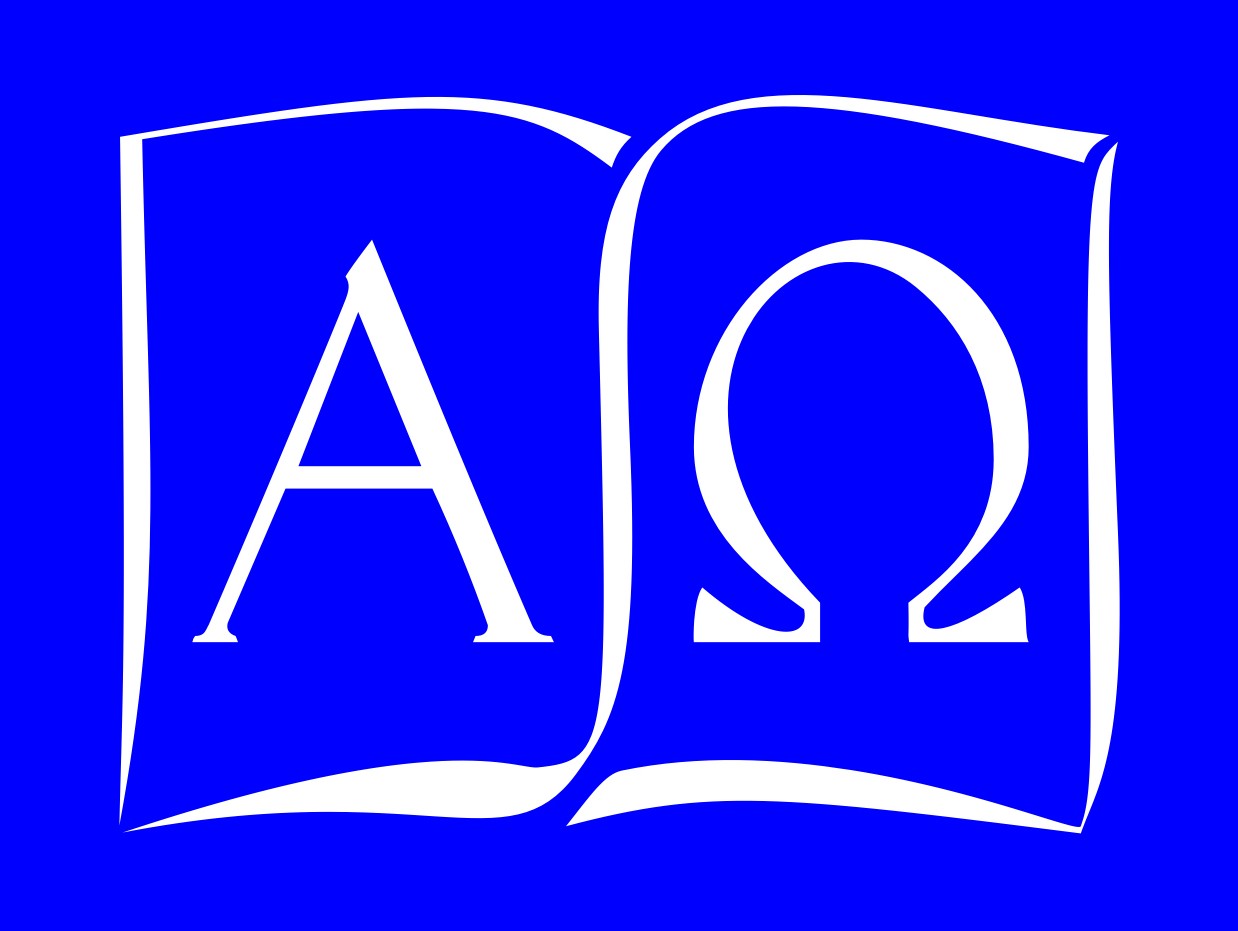Scholars Online Course List
Scholars Online Course Catalog for 2026
Scholars Online offers more rigorous, more intellectually honest, better rounded, and more socially stimulating education than any of the universities I have attended as student or taught at as faculty.
—John E., former student
To enroll in the courses below, create a member account (see Becoming a Member), then log in and use the menu from your secure account to create student accounts and enroll students in courses.
Summer Term courses for 2026
| History | |||
| Around the World in Nine Weeks | 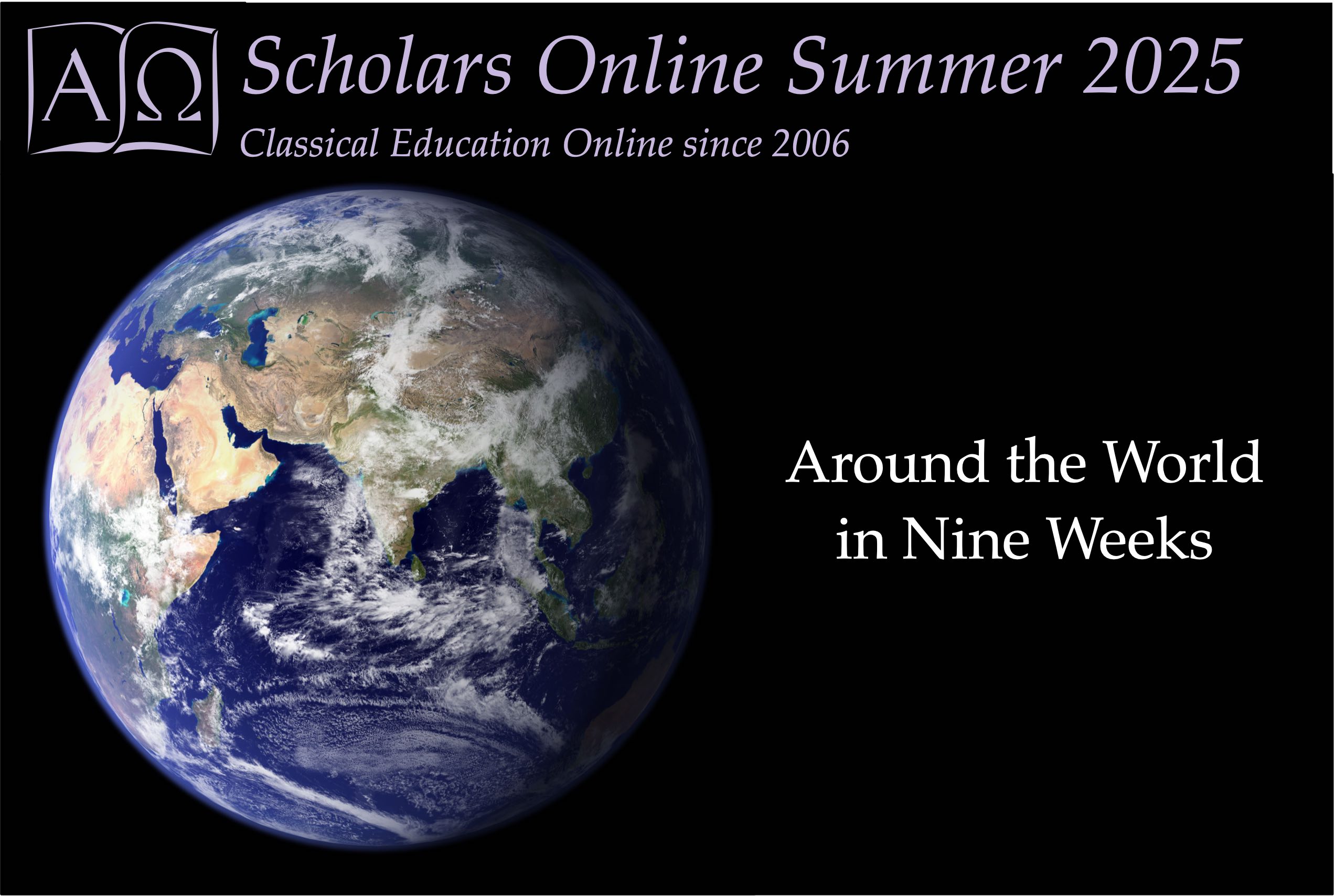 During our first session, we'll explore the nature of geography and its branches — physical, social, environmental, and regional, and the disciplines of mapmaking and chartmaking to display information tied to locations. In the following seven weeks, using short videos, animations, and live chat discussions, we will look at major regions of the world, focusing on physical geography. In our final session, you will present reports on a region or country that you find particularly fascinating.
Be better prepared to understand historical information, literary references, and current events! During our first session, we'll explore the nature of geography and its branches — physical, social, environmental, and regional, and the disciplines of mapmaking and chartmaking to display information tied to locations. In the following seven weeks, using short videos, animations, and live chat discussions, we will look at major regions of the world, focusing on physical geography. In our final session, you will present reports on a region or country that you find particularly fascinating.
Be better prepared to understand historical information, literary references, and current events! | 1: C. McMenomy Tu 11:00 AM-12:30 PM ET | $250.00 |
| Literature | |||
| Looking at Middle-earth | 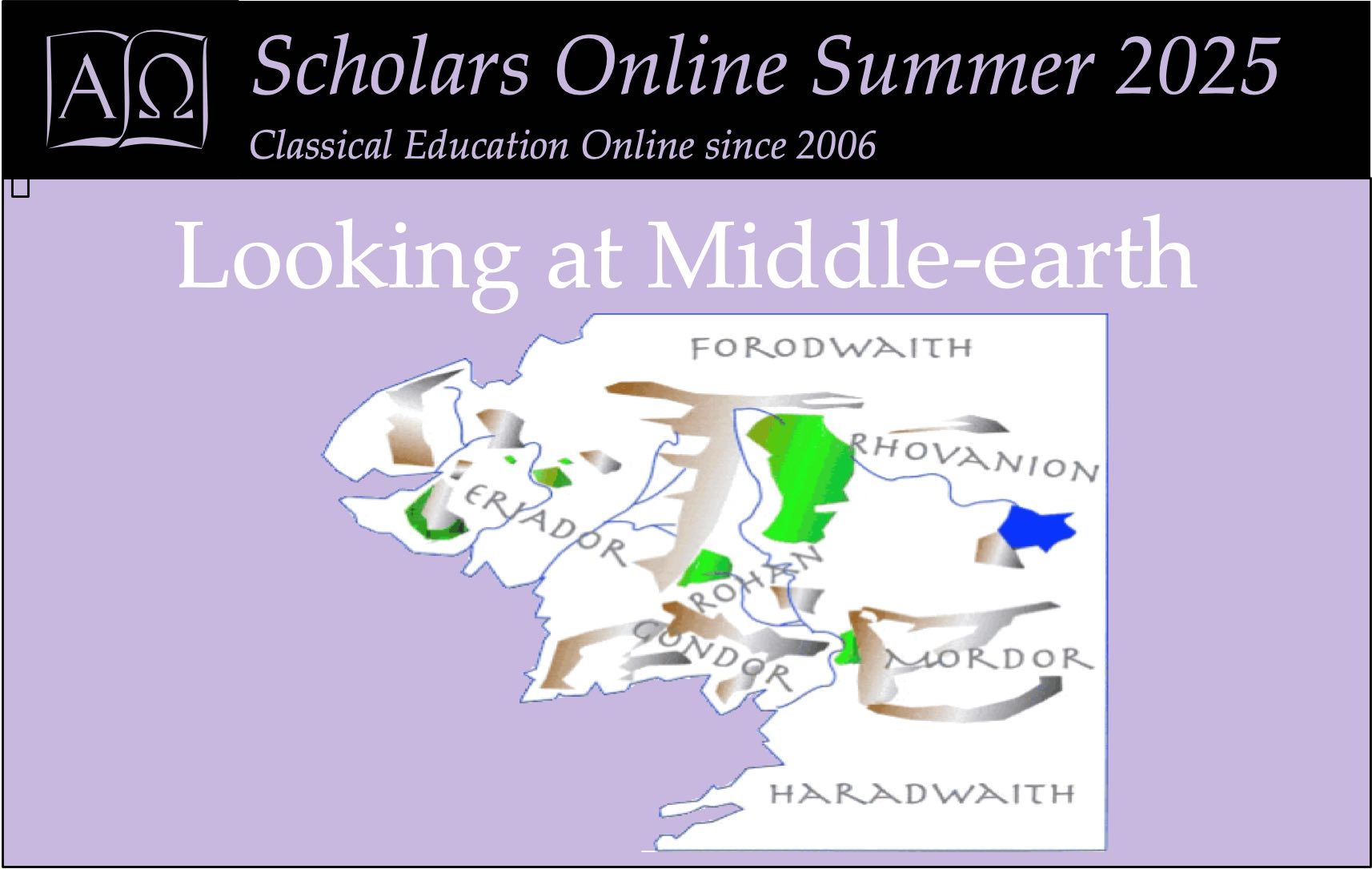 Based on the books, not the movies, this course considers many facets of J. R. R. Tolkien’s mythic creation, especially as embodied in The Hobbit and The Lord of the Rings. (Acquaintance with The Silmarillion or the multi-volume History of Middle-earth won’t go amiss, but is not required.) In a fairly free and un-pressured context, we look at Tolkien’s world-building, his use of language, his theology of “subcreation”, and certain facets of his life and professional work as a philologist that have a bearing on the vision he created. I’ve been a fan of Tolkien’s works since I was thirteen, and never tire of sharing them with a new generation. Based on the books, not the movies, this course considers many facets of J. R. R. Tolkien’s mythic creation, especially as embodied in The Hobbit and The Lord of the Rings. (Acquaintance with The Silmarillion or the multi-volume History of Middle-earth won’t go amiss, but is not required.) In a fairly free and un-pressured context, we look at Tolkien’s world-building, his use of language, his theology of “subcreation”, and certain facets of his life and professional work as a philologist that have a bearing on the vision he created. I’ve been a fan of Tolkien’s works since I was thirteen, and never tire of sharing them with a new generation. | 1: B. McMenomy Tu 1:00 PM-2:30 PM ET | $250.00 |
| Summer Shakespeare III | 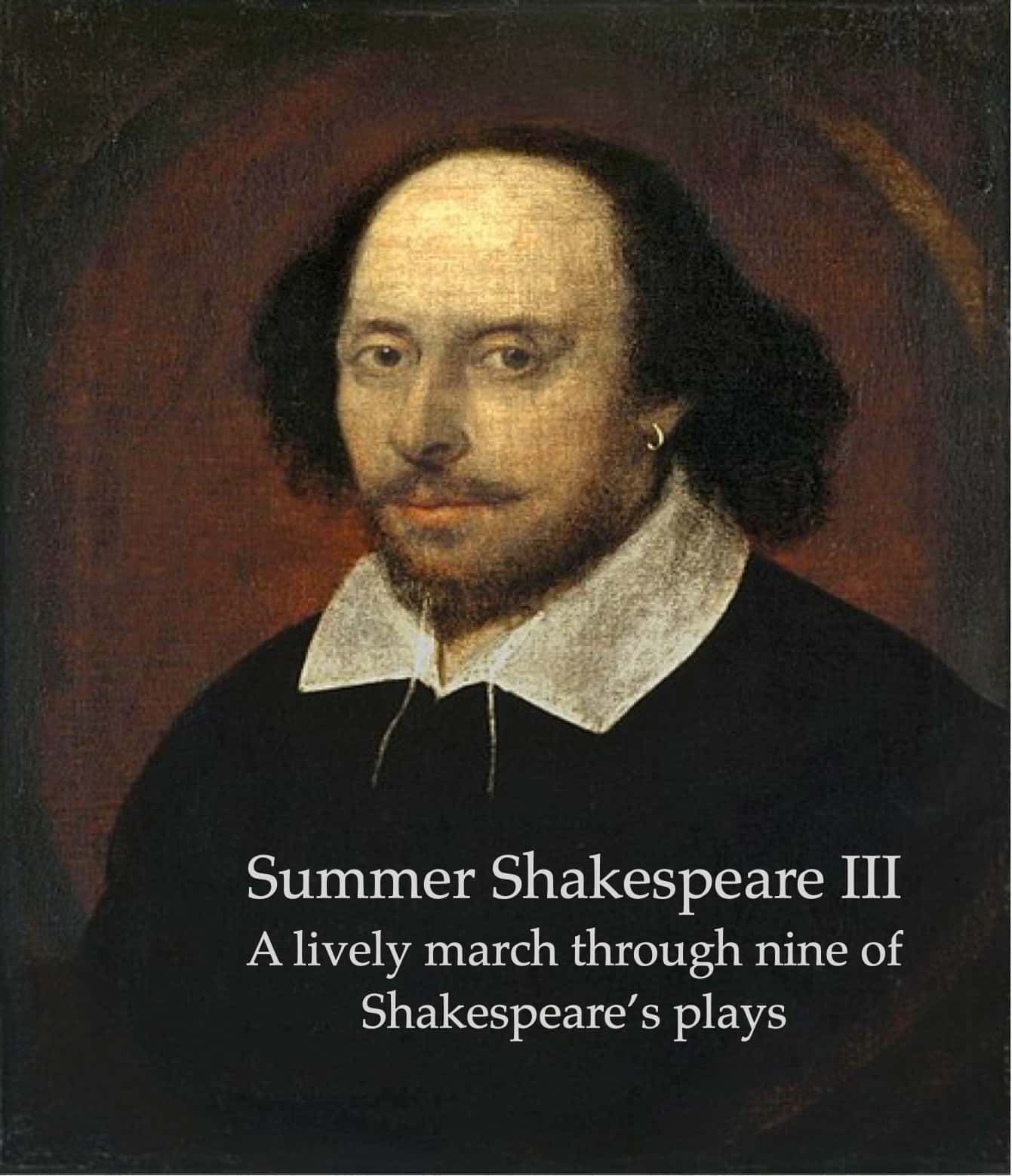 Summer Shakespeare III covers the nine plays that haven’t been taken up anywhere else in the Scholars Online literature curriculum, and it’s a mixed bag. Some of the plays are among the weaker works of Shakespeare; a couple are of dubious authenticity (such as King John and Henry VIII); a few are among the greats, but some (e.g., Othello) contain rather strong adult themes, and should be approached with some caution.
Because time is at a premium during the summer, and we want to accomplish as much as we possibly can, I’d like to hit the ground running with a play discussion the first week. Therefore, do not delay to enroll, and get the books as soon as possible. Specifics will be put onto a website and startup details e-mailed to enrolled students in the first week of June. Summer Shakespeare III covers the nine plays that haven’t been taken up anywhere else in the Scholars Online literature curriculum, and it’s a mixed bag. Some of the plays are among the weaker works of Shakespeare; a couple are of dubious authenticity (such as King John and Henry VIII); a few are among the greats, but some (e.g., Othello) contain rather strong adult themes, and should be approached with some caution.
Because time is at a premium during the summer, and we want to accomplish as much as we possibly can, I’d like to hit the ground running with a play discussion the first week. Therefore, do not delay to enroll, and get the books as soon as possible. Specifics will be put onto a website and startup details e-mailed to enrolled students in the first week of June.
| 1: B. McMenomy We 1:00 PM-3:00 PM ET | $275.00 |
| Programming | |||
| HTML Basics | 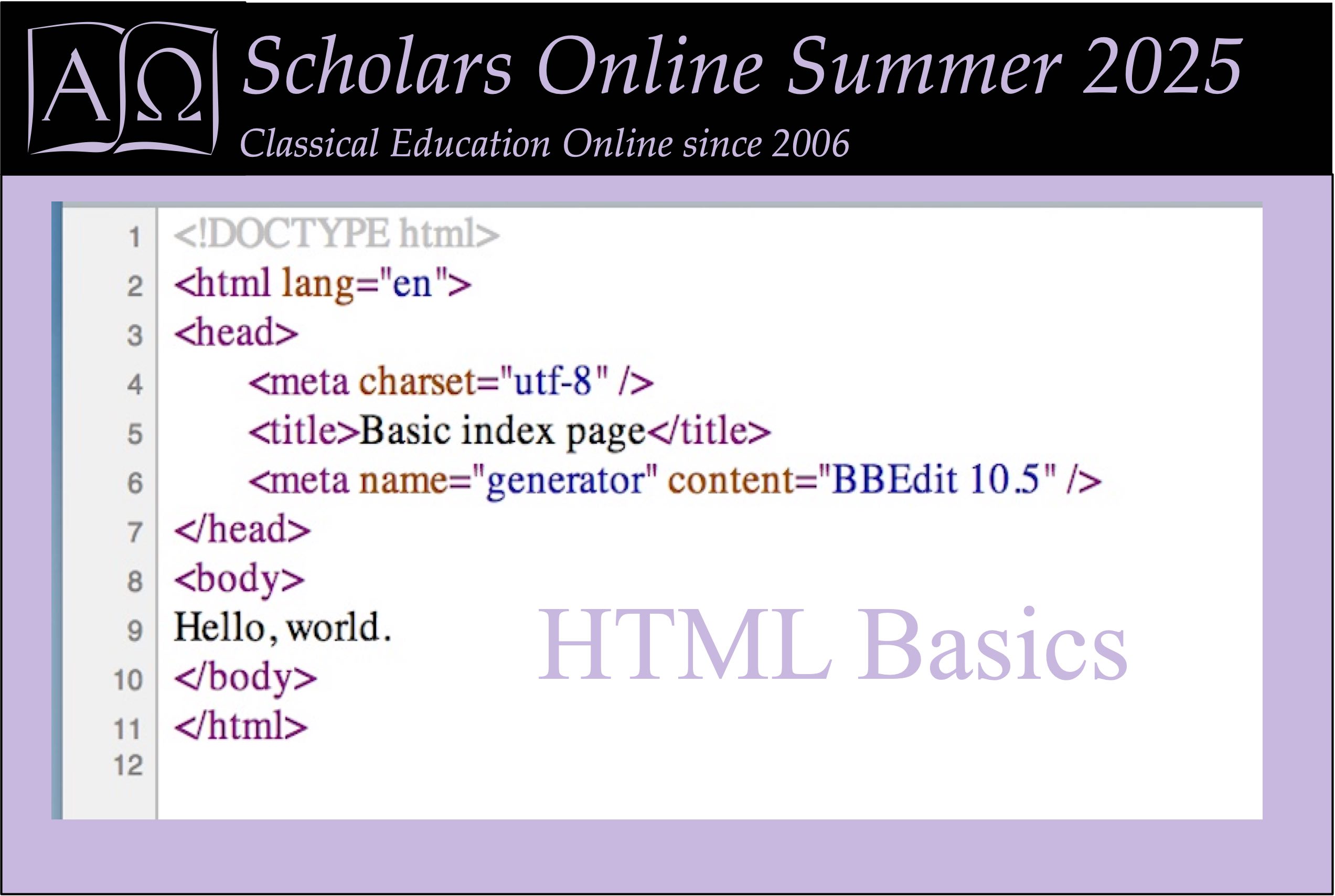 This course covers the basic elements of HTML5 (the current standard hypertext markup language) used in webpage production, with an emphasis on the fundamentals of web page mechanics and design. In a series of live chat sessions, students will copy and implement the techniques demonstrated and perform hands-on exercises to learn how HTML tags control page layout, fonts, links, lists, and tables. Students will create simple forms to collect information from the site user, and configure cascading style sheets to change the look and feel of their websites. We will also discuss site design and readability, and explore internet resources to continue development of basic skills. Note: This course is revised every year to incorporate the latest HTML5 features. This course covers the basic elements of HTML5 (the current standard hypertext markup language) used in webpage production, with an emphasis on the fundamentals of web page mechanics and design. In a series of live chat sessions, students will copy and implement the techniques demonstrated and perform hands-on exercises to learn how HTML tags control page layout, fonts, links, lists, and tables. Students will create simple forms to collect information from the site user, and configure cascading style sheets to change the look and feel of their websites. We will also discuss site design and readability, and explore internet resources to continue development of basic skills. Note: This course is revised every year to incorporate the latest HTML5 features. | 1: C. McMenomy We 1:00 PM-2:30 PM ET | $250.00 |
| Introduction to Programming with Scratch | 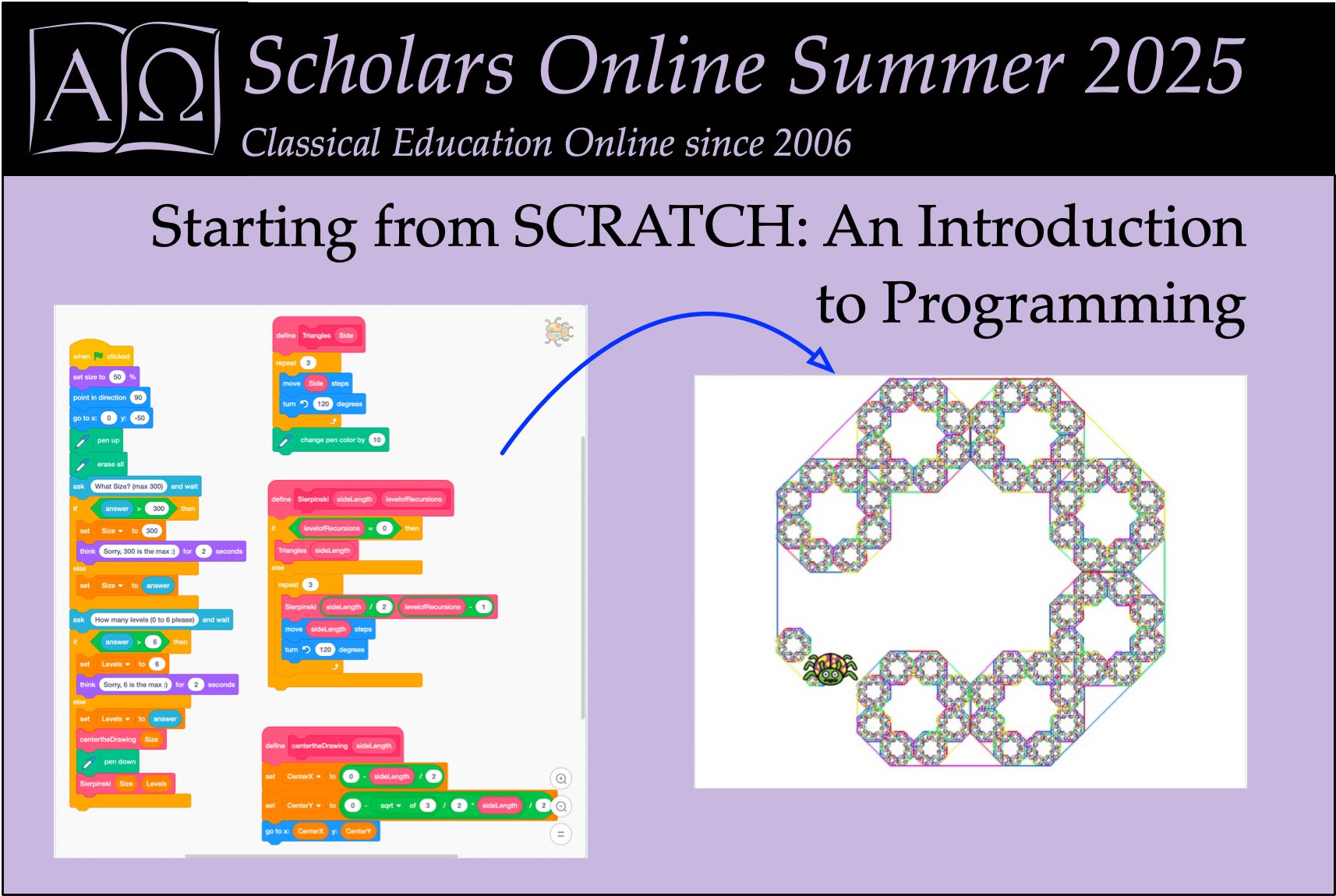 Learn the elements of basic programming using the innovative SCRATCH programming platform developed by the Lifelong Kindergarten Group at the Massachusetts Institute of Technology Media Lab. During chats, you will assemble pre-compiled code blocks rather than typing code, allowing you to focus on developing conceptual programming skills that can be applied to any advanced programming language. As we guide you step-by-step and show you how to use the different functions of Scratch in "real time", you will be able to create executable animation programs from the very first session. Over the eight week course, you will learn, program, and execute the fundamental programming constructions, including function calls, if-then-else logic, and iteration loops. You will be able to share the animations and games you create with your teacher and classmates and gain recognition for your work on the MIT SCRATCH platform. Learn the elements of basic programming using the innovative SCRATCH programming platform developed by the Lifelong Kindergarten Group at the Massachusetts Institute of Technology Media Lab. During chats, you will assemble pre-compiled code blocks rather than typing code, allowing you to focus on developing conceptual programming skills that can be applied to any advanced programming language. As we guide you step-by-step and show you how to use the different functions of Scratch in "real time", you will be able to create executable animation programs from the very first session. Over the eight week course, you will learn, program, and execute the fundamental programming constructions, including function calls, if-then-else logic, and iteration loops. You will be able to share the animations and games you create with your teacher and classmates and gain recognition for your work on the MIT SCRATCH platform. | 1: C. McMenomy Tu 9:30 AM-10:49 AM ET | $250.00 |
| Science | |||
| The Chemical History of the Candle |  We will use the lectures Michael Faraday delivered in 1861 as a starting point to discuss scientific methods and experimentation, chemical composition of wax, combustion reactions, forces and energy, and the history of the human scientific endeavor. Faraday is still regarded as one of the greatest experimental scientists of all time, and his lectures are filled with his excitement over the wonders of natural phenomena, as well as detailed observations on the behavior of elements like hydrogen, oxygen, and carbon, and practical demonstrations of experimental observational methods. We will use the lectures Michael Faraday delivered in 1861 as a starting point to discuss scientific methods and experimentation, chemical composition of wax, combustion reactions, forces and energy, and the history of the human scientific endeavor. Faraday is still regarded as one of the greatest experimental scientists of all time, and his lectures are filled with his excitement over the wonders of natural phenomena, as well as detailed observations on the behavior of elements like hydrogen, oxygen, and carbon, and practical demonstrations of experimental observational methods.
All students will perform several of Faraday's experiments (adapted for safety and easy home performance) so they can develop proper experimental techniques. Then we will write up our results and discuss them. This is an excellent opportunity for junior high and early high school students to prepare for high school level science courses. | 1: C. McMenomy We 11:00 AM-12:30 PM ET | $250.00 |
| Writing | |||
| How to Become a Precocious Student | 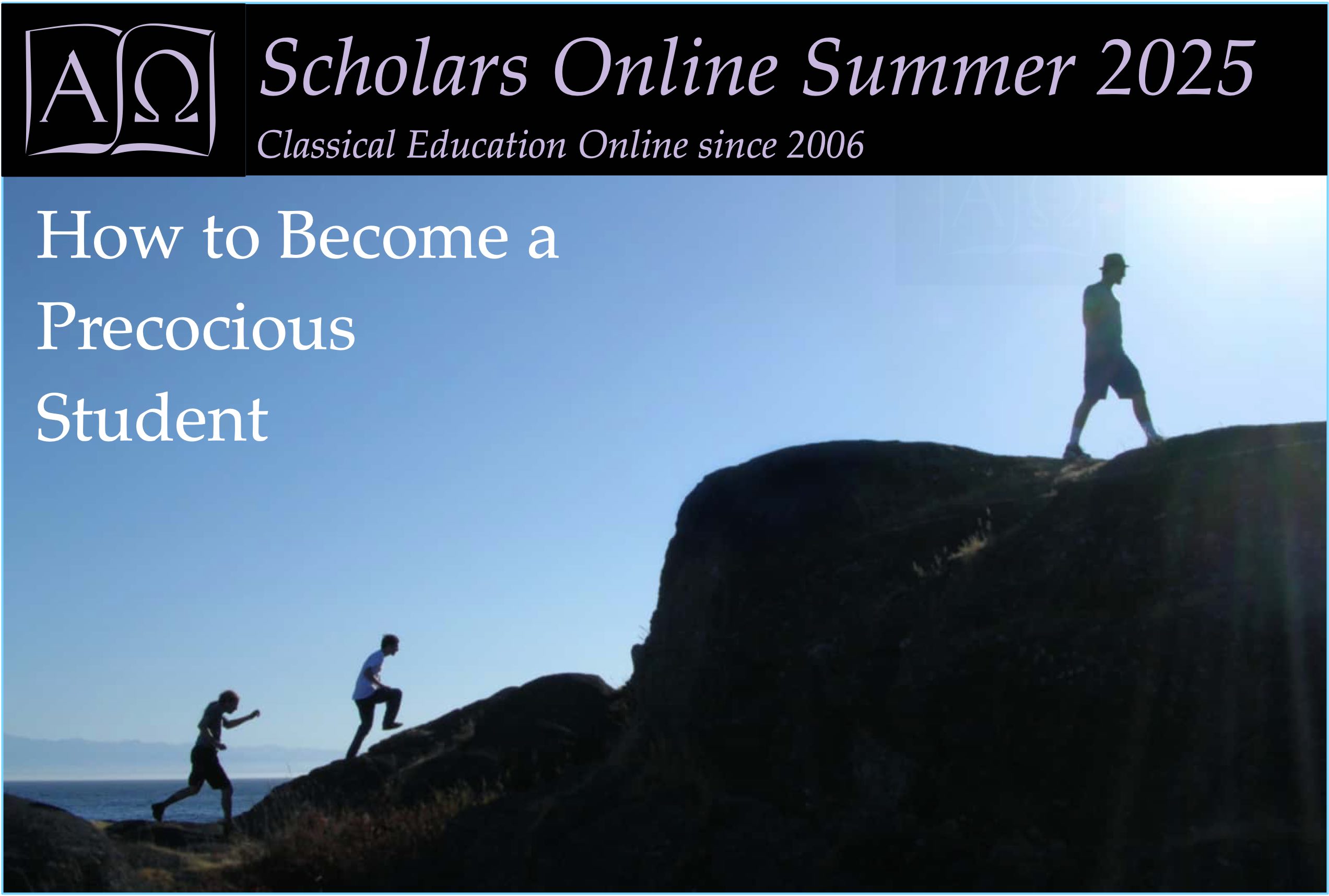 Learn the study methods of master students!
Students often struggle with basic study skills, superficially passing over material in an effort to finish assigned tasks and check them off, but not really understanding or retaining what they are learning. In this eight-week course, we'll look at critical study skills every student needs, including how to make friends with your textbook, decipher graphical information, memorize important facts, and manage time for both short term and long term projects. We'll also talk about the importance of concentration and contemplation in mastering complex material.
Because this course benefits the teachers as well as the student, students completing this summer course will receive a $50 credit toward one academic year course. Credits may not be transferred to another student. Learn the study methods of master students!
Students often struggle with basic study skills, superficially passing over material in an effort to finish assigned tasks and check them off, but not really understanding or retaining what they are learning. In this eight-week course, we'll look at critical study skills every student needs, including how to make friends with your textbook, decipher graphical information, memorize important facts, and manage time for both short term and long term projects. We'll also talk about the importance of concentration and contemplation in mastering complex material.
Because this course benefits the teachers as well as the student, students completing this summer course will receive a $50 credit toward one academic year course. Credits may not be transferred to another student. | 1: C. McMenomy We 9:30 AM-10:50 AM ET | $250.00 |
| Molding Your Prose | 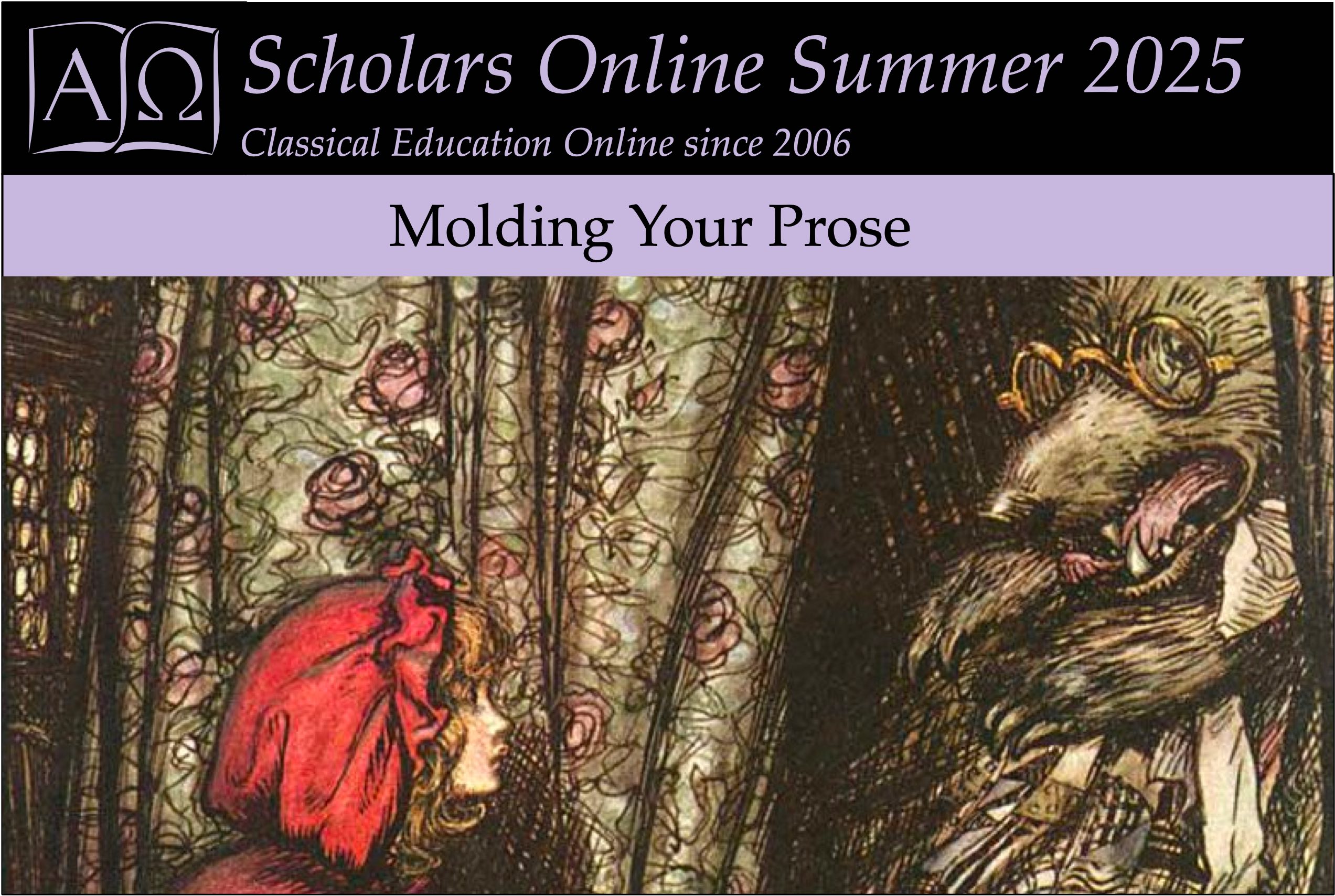 This course fosters familiarity with the writing process by asking the student to write a sequence of exercises based on the same basic narrative material. Along the way, students learn that written material does not steer itself: it can be adapted almost infinitely to a variety of forms and requirements. In this respect, it is an introduction to both other writing courses and to literary study. This course fosters familiarity with the writing process by asking the student to write a sequence of exercises based on the same basic narrative material. Along the way, students learn that written material does not steer itself: it can be adapted almost infinitely to a variety of forms and requirements. In this respect, it is an introduction to both other writing courses and to literary study. | 1: B. McMenomy Tu 11:00 AM-12:30 PM ET | $250.00 |
| Writing the Research Paper | 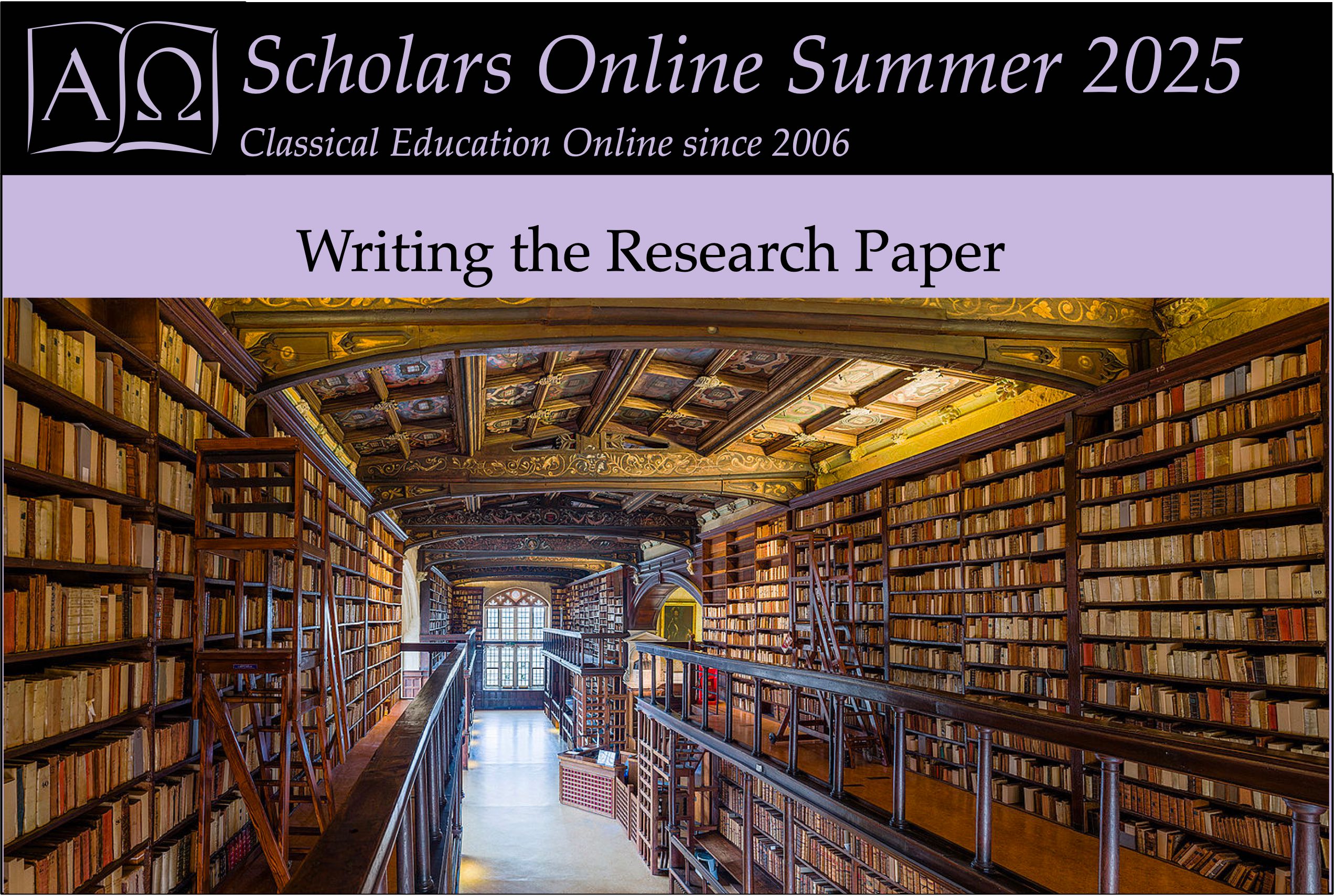 Students will develop a disciplined approach to writing the research paper: a sustained activity requiring imagination, introspection, research, organization, and of course, writing! We will learn how to identify an appropriate topic, perform initial research to refine the topic, carry out more detailed research and take notes, organize our results, outline and draft the formal paper using one of several common formats, create a bibliography, proofread, and present our final version. Students will develop a disciplined approach to writing the research paper: a sustained activity requiring imagination, introspection, research, organization, and of course, writing! We will learn how to identify an appropriate topic, perform initial research to refine the topic, carry out more detailed research and take notes, organize our results, outline and draft the formal paper using one of several common formats, create a bibliography, proofread, and present our final version.
| 1: C. McMenomy Tu 9:30 AM-10:50 AM ET | $250.00 |
| Molding Your Argument | 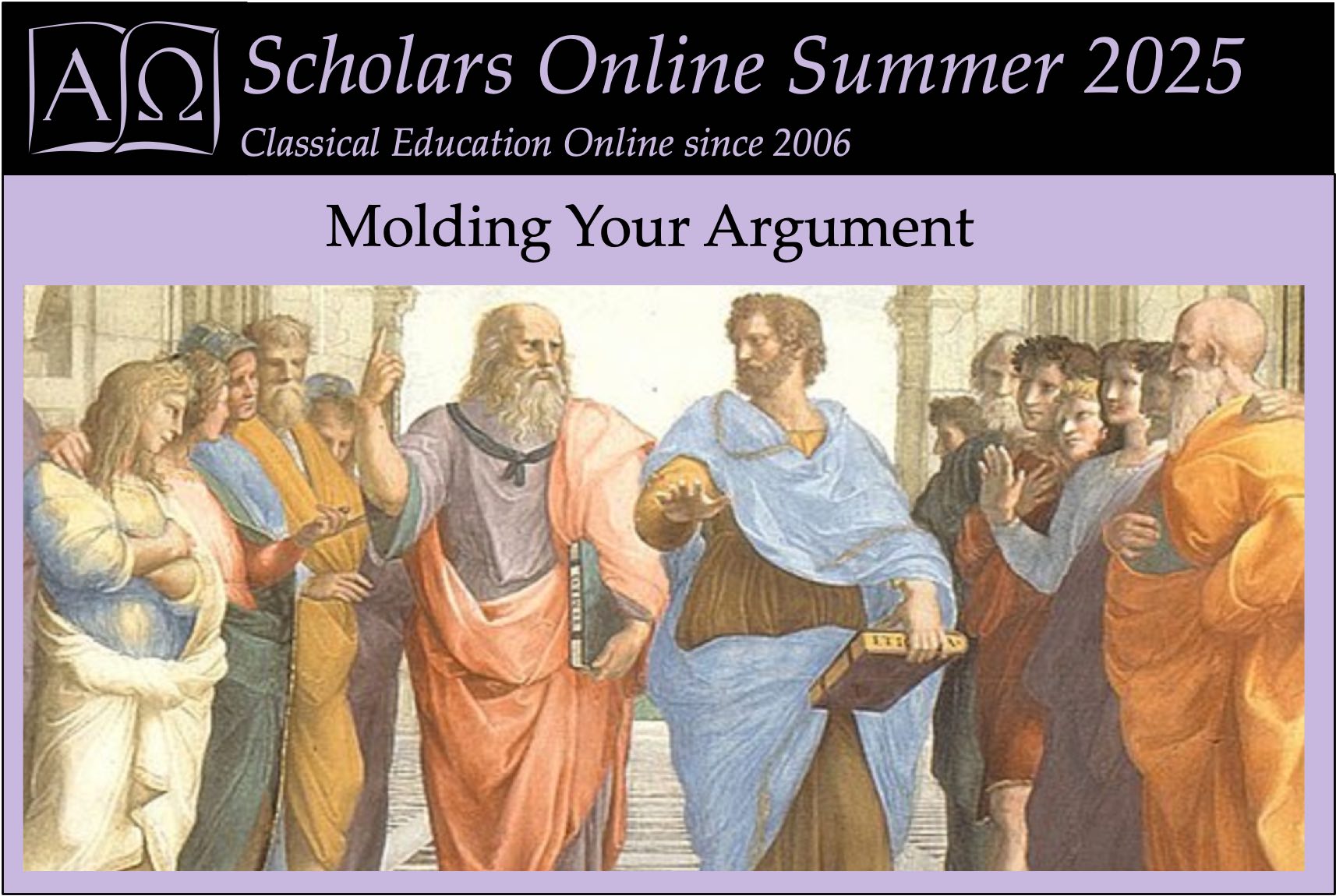 Modeled on "Molding Your Prose", this course involves developing a sequence of arguments from the same topics by varying their structure to correspond to a range of pre-defined forms, from simple thesis statements and simple paragraphs, through the five-paragraph essay, the Thomistic scholastic model, and the Roman rhetorical outline applied by Cicero and his contemporaries. Modeled on "Molding Your Prose", this course involves developing a sequence of arguments from the same topics by varying their structure to correspond to a range of pre-defined forms, from simple thesis statements and simple paragraphs, through the five-paragraph essay, the Thomistic scholastic model, and the Roman rhetorical outline applied by Cicero and his contemporaries. | 1: B. McMenomy We 11:00 AM-12:30 PM ET | $250.00 |
Academic Year courses for Fall 2026 - Spring 2027
| Latin | |||
| Latin I | 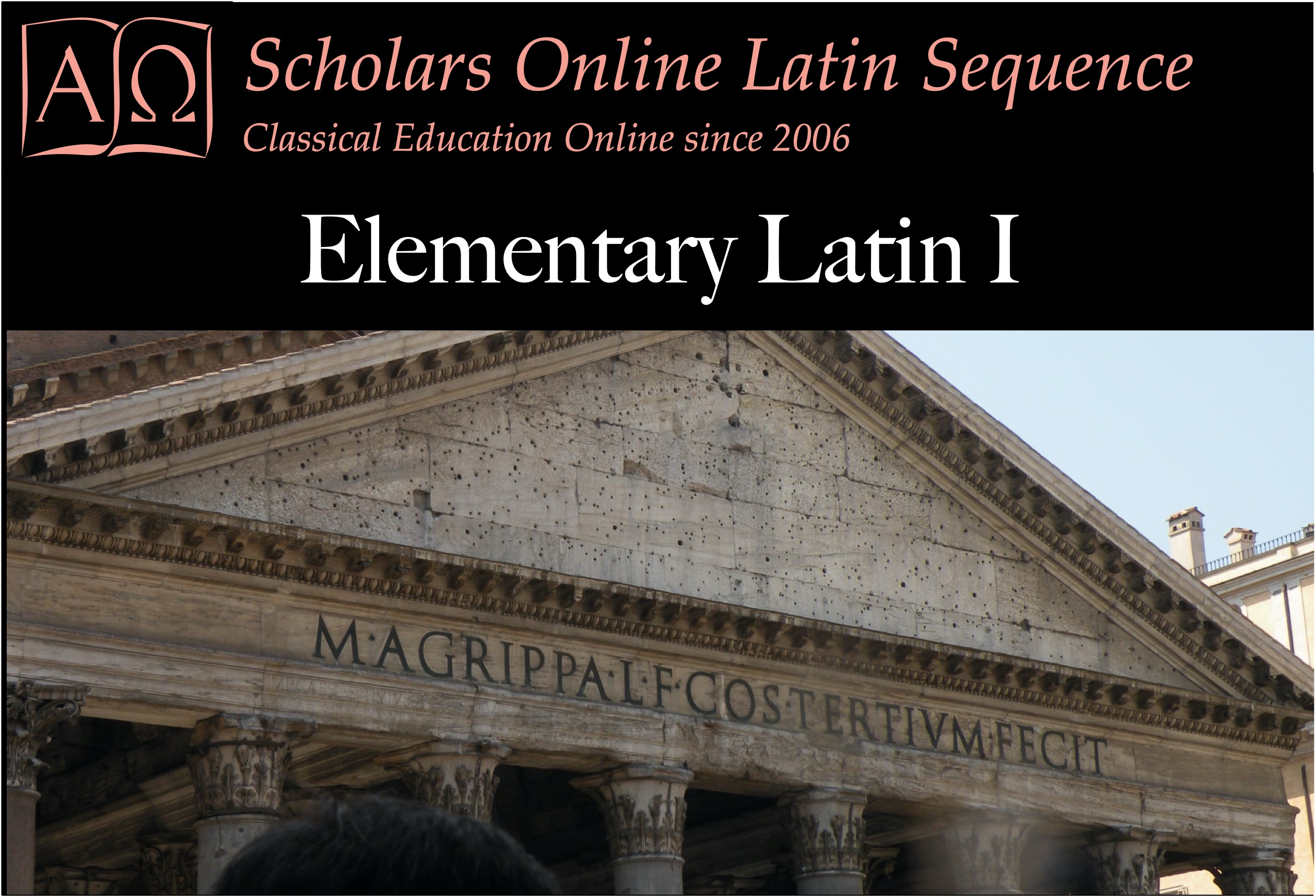 Latin I and Latin II together provide the elements of the language in a disciplined context, with an emphasis on mastery of inflections and syntactical constructions, using Frederic Wheelock's Wheelock's Latin Grammar. The first year covers the first twenty chapters of the book. Latin I and Latin II together provide the elements of the language in a disciplined context, with an emphasis on mastery of inflections and syntactical constructions, using Frederic Wheelock's Wheelock's Latin Grammar. The first year covers the first twenty chapters of the book. | 1: S. Dennis Mo 9:00 AM-10:30 AM ET • We 9:00 AM-10:30 AM ET | $700.00 |
| 2: S. Dennis Tu 11:00 AM-12:30 PM ET • Th 11:00 AM-12:30 PM ET | $700.00 | ||
| Latin II | 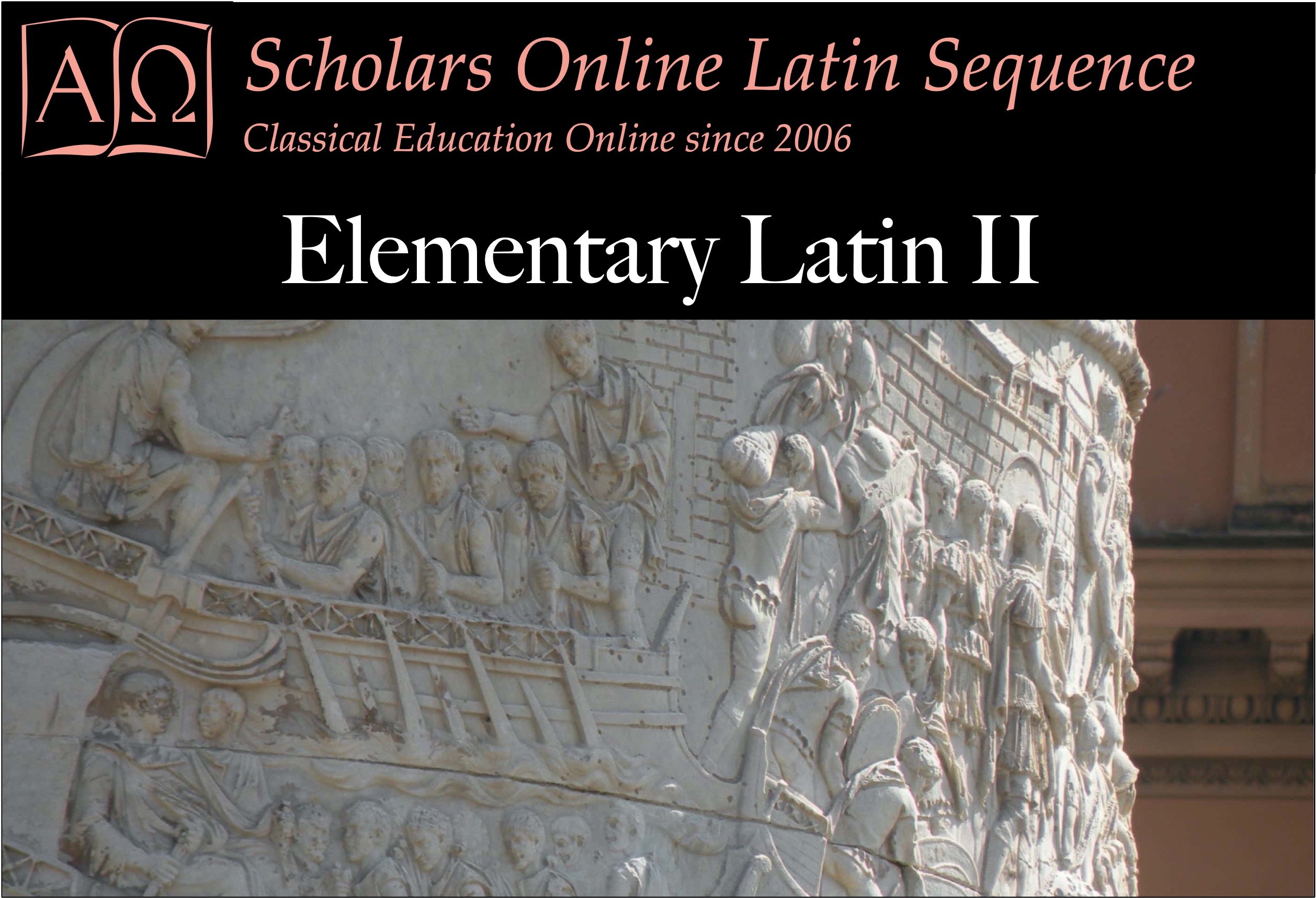 Latin II continues the elementary course begun in Latin I, covering the last twenty chapters of Wheelock's Latin Grammar. By the end of the course, students have encountered representative passages of a variety of prose and poetry, and are prepared to continue with a wide range of material. Latin II continues the elementary course begun in Latin I, covering the last twenty chapters of Wheelock's Latin Grammar. By the end of the course, students have encountered representative passages of a variety of prose and poetry, and are prepared to continue with a wide range of material. | 1: S. Dennis Mo 11:00 AM-12:30 PM ET • We 11:00 AM-12:30 PM ET | $700.00 |
| 2: S. Dennis Tu 9:00 AM-10:30 AM ET • Th 9:00 AM-10:30 AM ET | $700.00 | ||
| Latin III | 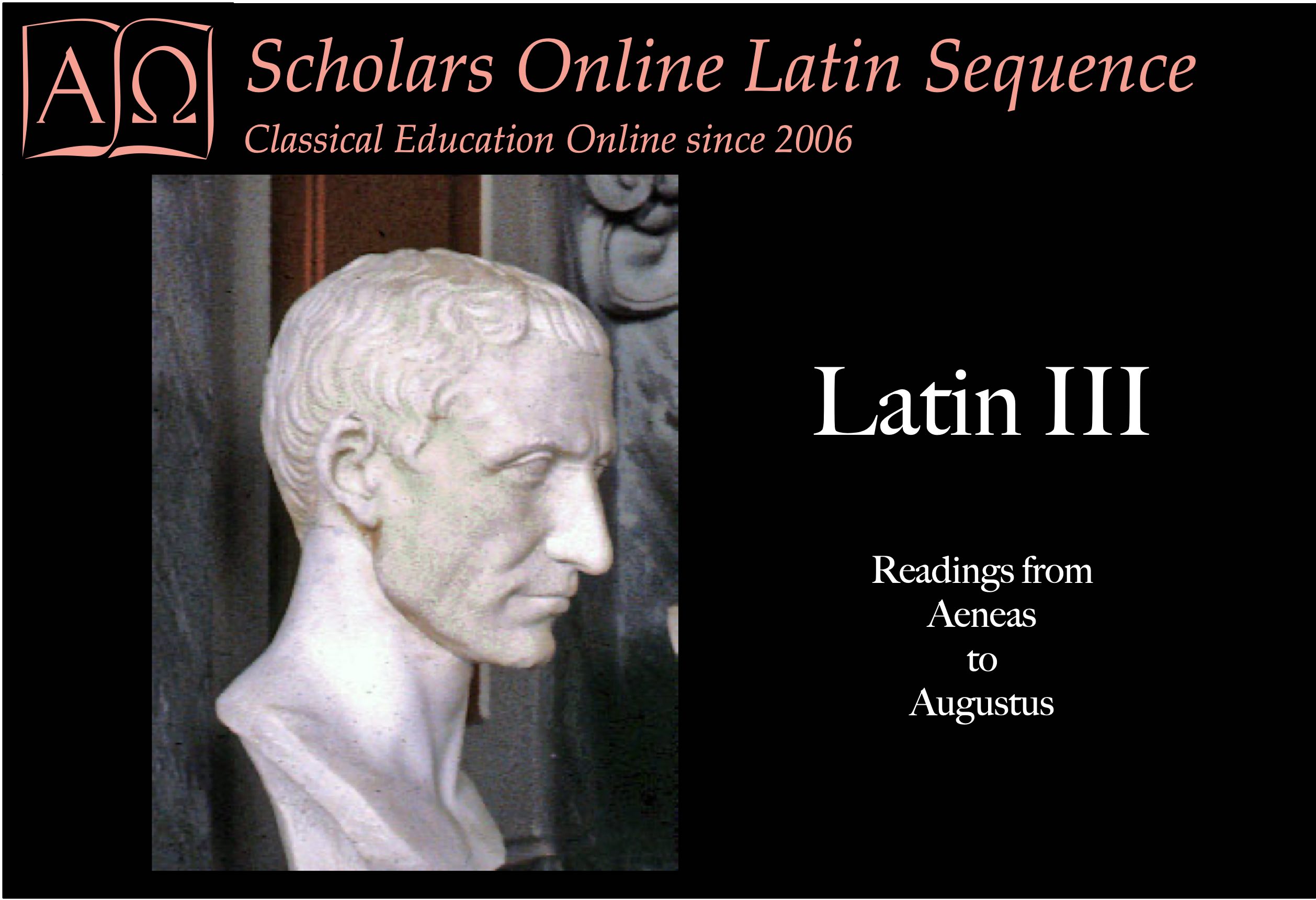 Using the long-established and brilliantly annotated collection From Aeneas to Augustus, this course offers a range of engaging readings on the history of Rome from its foundation down to the end of the Republic. Students will find old favorite stories and discover new ones — from semi-mythical narratives like the story of Horatius at the bridge to wry personal letters of Cicero. Throughout we’ll be systematically reviewing both the grammatical basics that were covered in the elementary Latin sequence and building a framework for understanding Roman history, all of which will continue to be useful in understanding the material of Latin IV. Using the long-established and brilliantly annotated collection From Aeneas to Augustus, this course offers a range of engaging readings on the history of Rome from its foundation down to the end of the Republic. Students will find old favorite stories and discover new ones — from semi-mythical narratives like the story of Horatius at the bridge to wry personal letters of Cicero. Throughout we’ll be systematically reviewing both the grammatical basics that were covered in the elementary Latin sequence and building a framework for understanding Roman history, all of which will continue to be useful in understanding the material of Latin IV. | 1: B. McMenomy Mo 4:00 PM-5:30 PM ET • We 4:00 PM-5:30 PM ET | $750.00 |
| Literature | |||
| The Thought Plickens: Learning to Think Critically | 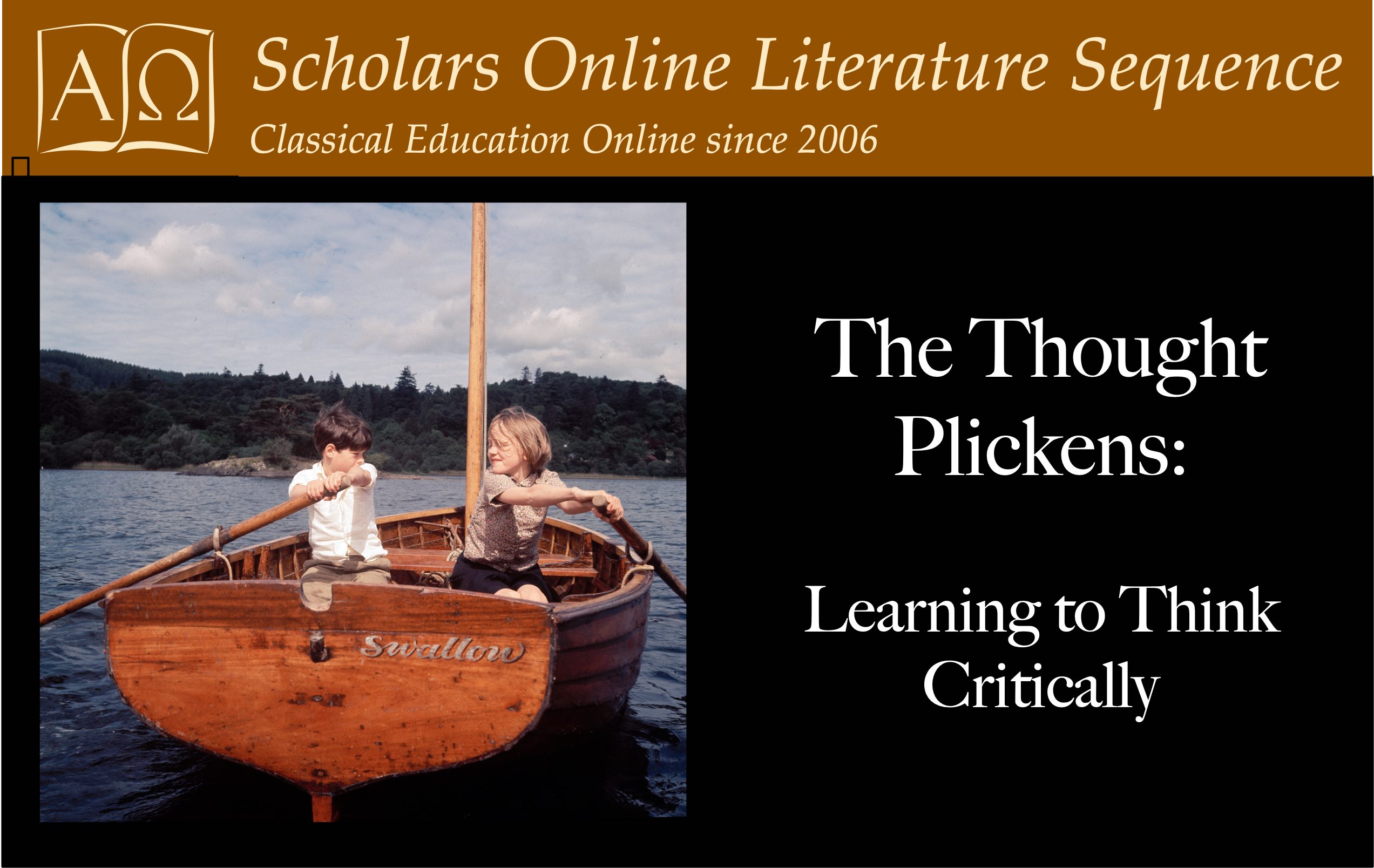 This class is primarily for students in 6th-8th grade. If you intend to take the Fairytales and Mythology class, it would be best to take that before Plickens.
The purpose of this class is to prepare students of a younger age group for the more intensive reading and critical thinking (i.e. the five paragraph essay) assignments of high school.
It will introduce the students to novels that have a deeper subtext, that are applicable to transitioning into their teenage years and in some cases an awareness to social structures in the world at large.
In addition to the aforementioned overarching concepts of the novel, there will be a focus on reading for details as well. Students are essentially being taught to be literary detectives - seeking out general plot themes and picking apart the minutiae of character, narrative and historical background. This class is primarily for students in 6th-8th grade. If you intend to take the Fairytales and Mythology class, it would be best to take that before Plickens.
The purpose of this class is to prepare students of a younger age group for the more intensive reading and critical thinking (i.e. the five paragraph essay) assignments of high school.
It will introduce the students to novels that have a deeper subtext, that are applicable to transitioning into their teenage years and in some cases an awareness to social structures in the world at large.
In addition to the aforementioned overarching concepts of the novel, there will be a focus on reading for details as well. Students are essentially being taught to be literary detectives - seeking out general plot themes and picking apart the minutiae of character, narrative and historical background. | Section dates, times, and tuition TBD. | |
| World Literature | 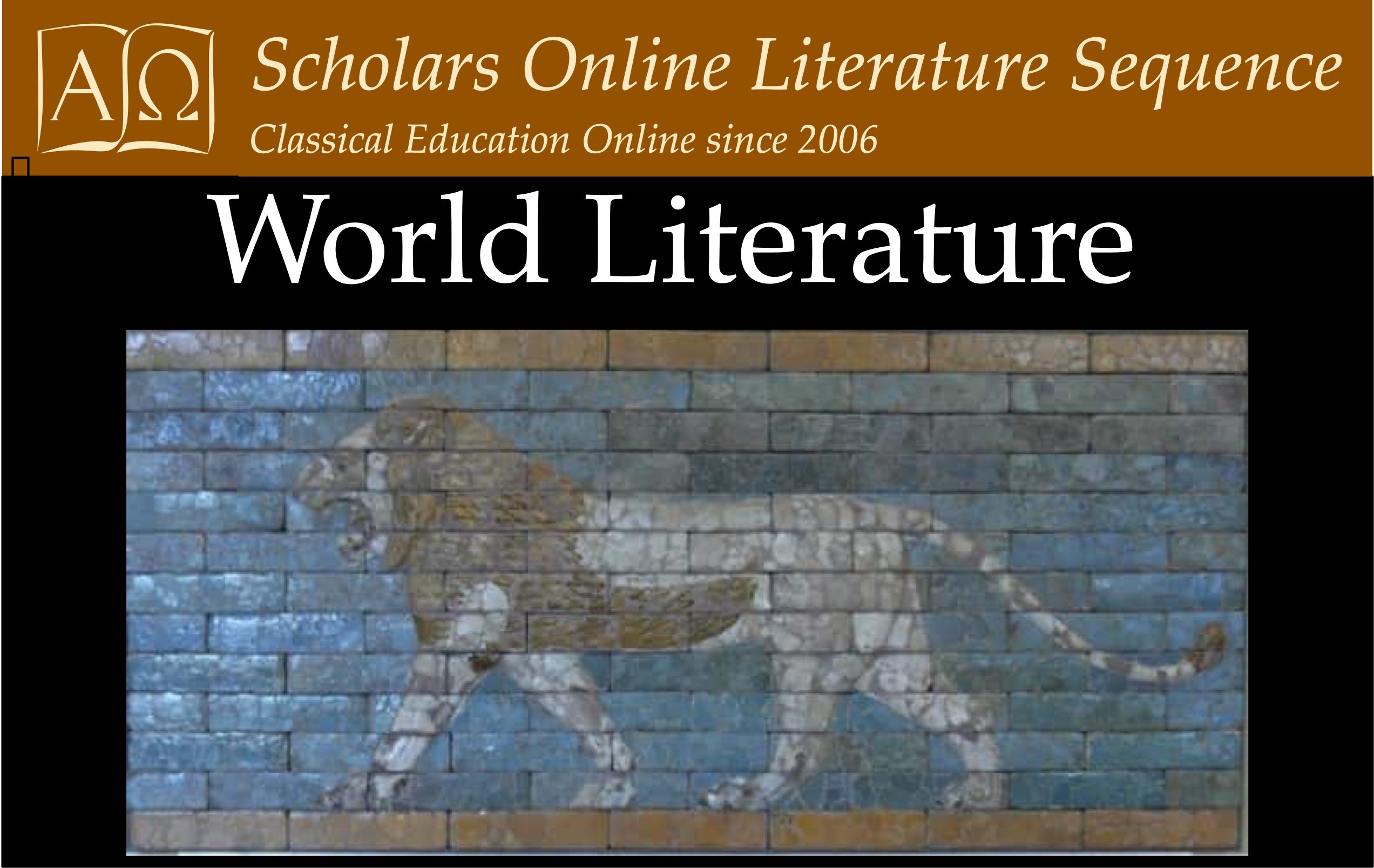 Based on a broad anthology, this course examines the variety of literary genres and types in a range of cultures from the earliest times to the present day. We discuss a variety of topics alongside the readings themselves, including the problems of translation, the nature of excerpts, the nature of the hero, the formation of an authorial voice, and genres such as lyric, drama, proverb, myth, and epic. We also get a chance to read three major plays entire — Sophocles’ Oedipus Rex, Shakespeare’s The Tempest, and Ibsen’s A Doll’s House. The class is not overly demanding, but can be a lot of fun, and a comfortable introduction to reading and thinking in a literary mode. Based on a broad anthology, this course examines the variety of literary genres and types in a range of cultures from the earliest times to the present day. We discuss a variety of topics alongside the readings themselves, including the problems of translation, the nature of excerpts, the nature of the hero, the formation of an authorial voice, and genres such as lyric, drama, proverb, myth, and epic. We also get a chance to read three major plays entire — Sophocles’ Oedipus Rex, Shakespeare’s The Tempest, and Ibsen’s A Doll’s House. The class is not overly demanding, but can be a lot of fun, and a comfortable introduction to reading and thinking in a literary mode. | 1: B. McMenomy Tu 11:00 AM-12:30 PM ET | $650.00 |
| Western Literature to Dante | 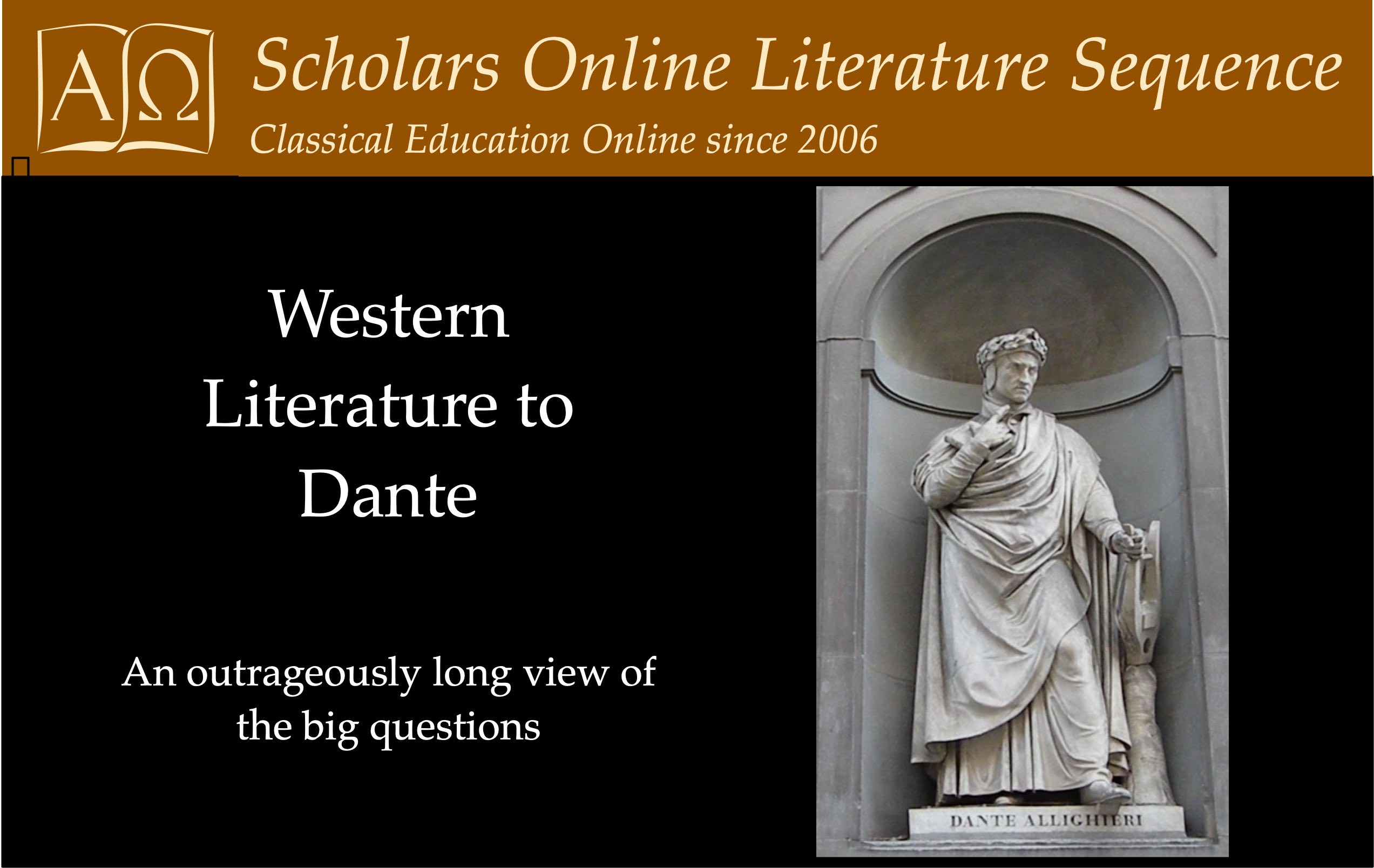 An extensive exposure to the literature of ancient and mediaeval times, from scripture through mediaeval epic and romance, this tough but engaging course is unlike any other you are likely to find. It requires a large amount of reading, while exploring its themes and problems at a fairly high level, weighing what is alien and what is familiar to us in cultures separated from us by long stretches of history. It also serves as an introduction to classical literature for those who want to pursue Greek and/or Latin seriously beyond the mere rudiments of the language. It has also been taken on several occasions by adults, who are more than welcome to participate if they behave themselves Taught continuously since 1996, this course has often been cited by graduating seniors as their favorite class in the literature sequence; many of them have continued to study classics or mediaeval literature in college. It is occasionally supplemented by a Western Literature to Dante II course, which covers (mostly) the same time period, but goes through a completely different body of literature. An extensive exposure to the literature of ancient and mediaeval times, from scripture through mediaeval epic and romance, this tough but engaging course is unlike any other you are likely to find. It requires a large amount of reading, while exploring its themes and problems at a fairly high level, weighing what is alien and what is familiar to us in cultures separated from us by long stretches of history. It also serves as an introduction to classical literature for those who want to pursue Greek and/or Latin seriously beyond the mere rudiments of the language. It has also been taken on several occasions by adults, who are more than welcome to participate if they behave themselves Taught continuously since 1996, this course has often been cited by graduating seniors as their favorite class in the literature sequence; many of them have continued to study classics or mediaeval literature in college. It is occasionally supplemented by a Western Literature to Dante II course, which covers (mostly) the same time period, but goes through a completely different body of literature. | 1: B. McMenomy Mo 1:00 PM-2:30 PM ET | $700.00 |
| English Literature | 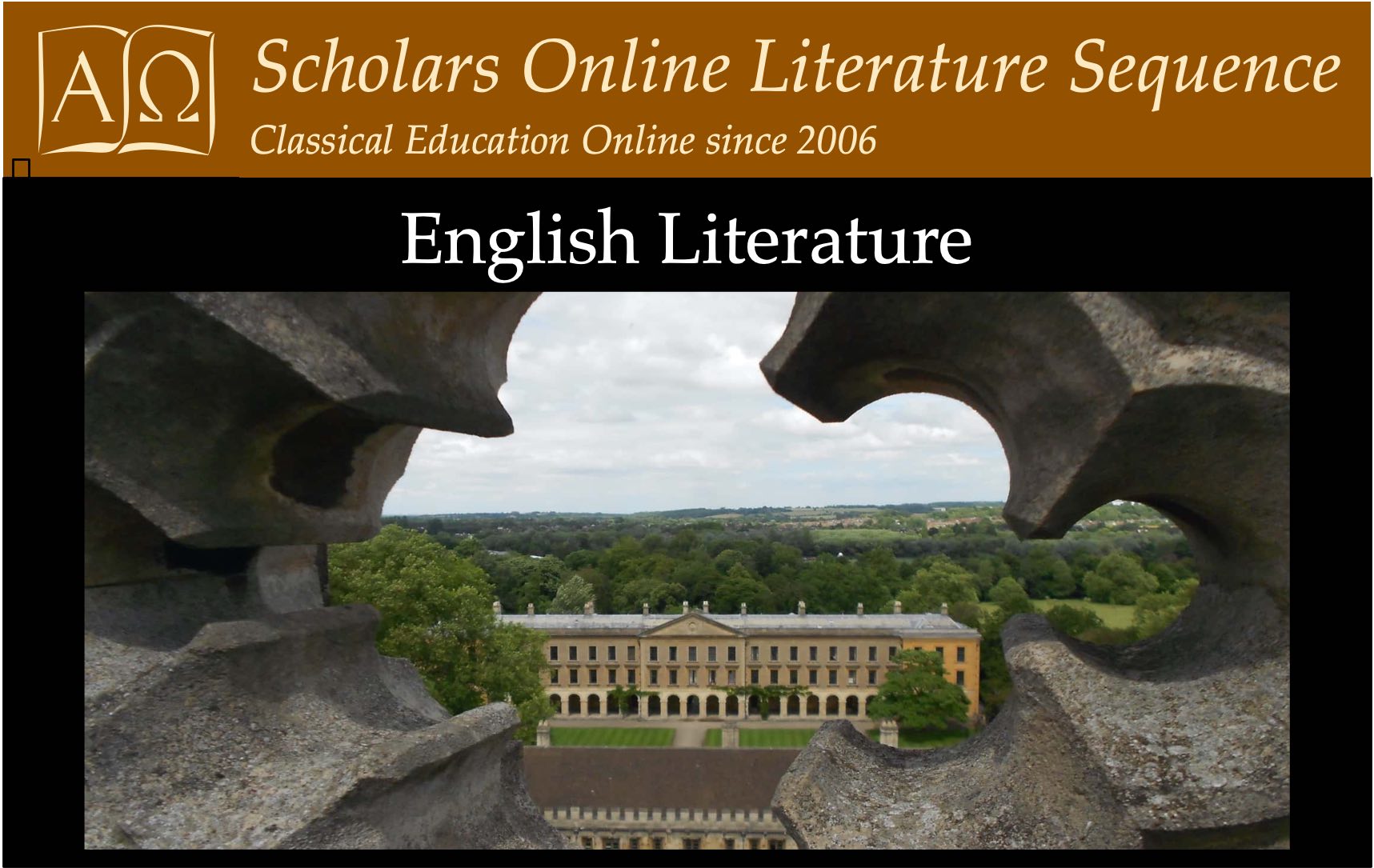 We survey English literature historically from the earliest survivals to the twentieth century, tracing the development of themes, ideas, and techniques of writing, as well as looking at the long and fascinating history of the language itself.
The course is built around a very solid textbook, England in Literature, part of the “America Reads” series from Scott, Foresman. It is unfortunately out of print, but copies remain available. We supplement the readings with a couple of Shakespeare plays and a few novels, and some incidental smaller items made available online.
From a pedagogical point of view, the course introduces the idea of close reading of texts: whereas Western Literature to Dante focuses on extensive reading of a wide range of material, all of it in translation, English Literature is more intensive: it looks at a smaller body of material more closely. In part this is possible because we will be examining most of the texts as they were originally written, with only the occasional minor adjustments for spelling. The Old and Middle English materials (not normally accessible to high school students without considerable specialized language study) are given here in modern translations, but beginning in the Renaissance, texts are as originally written. Throughout the course we try to mold careful and analytical readers, responding to the literature with a discerning and charitable eye. Students especially intrigued by the older forms of English are welcome to take Old English when we offer it. We survey English literature historically from the earliest survivals to the twentieth century, tracing the development of themes, ideas, and techniques of writing, as well as looking at the long and fascinating history of the language itself.
The course is built around a very solid textbook, England in Literature, part of the “America Reads” series from Scott, Foresman. It is unfortunately out of print, but copies remain available. We supplement the readings with a couple of Shakespeare plays and a few novels, and some incidental smaller items made available online.
From a pedagogical point of view, the course introduces the idea of close reading of texts: whereas Western Literature to Dante focuses on extensive reading of a wide range of material, all of it in translation, English Literature is more intensive: it looks at a smaller body of material more closely. In part this is possible because we will be examining most of the texts as they were originally written, with only the occasional minor adjustments for spelling. The Old and Middle English materials (not normally accessible to high school students without considerable specialized language study) are given here in modern translations, but beginning in the Renaissance, texts are as originally written. Throughout the course we try to mold careful and analytical readers, responding to the literature with a discerning and charitable eye. Students especially intrigued by the older forms of English are welcome to take Old English when we offer it. | 1: B. McMenomy We 11:00 AM-12:30 PM ET | $700.00 |
| Senior English (Literature) | 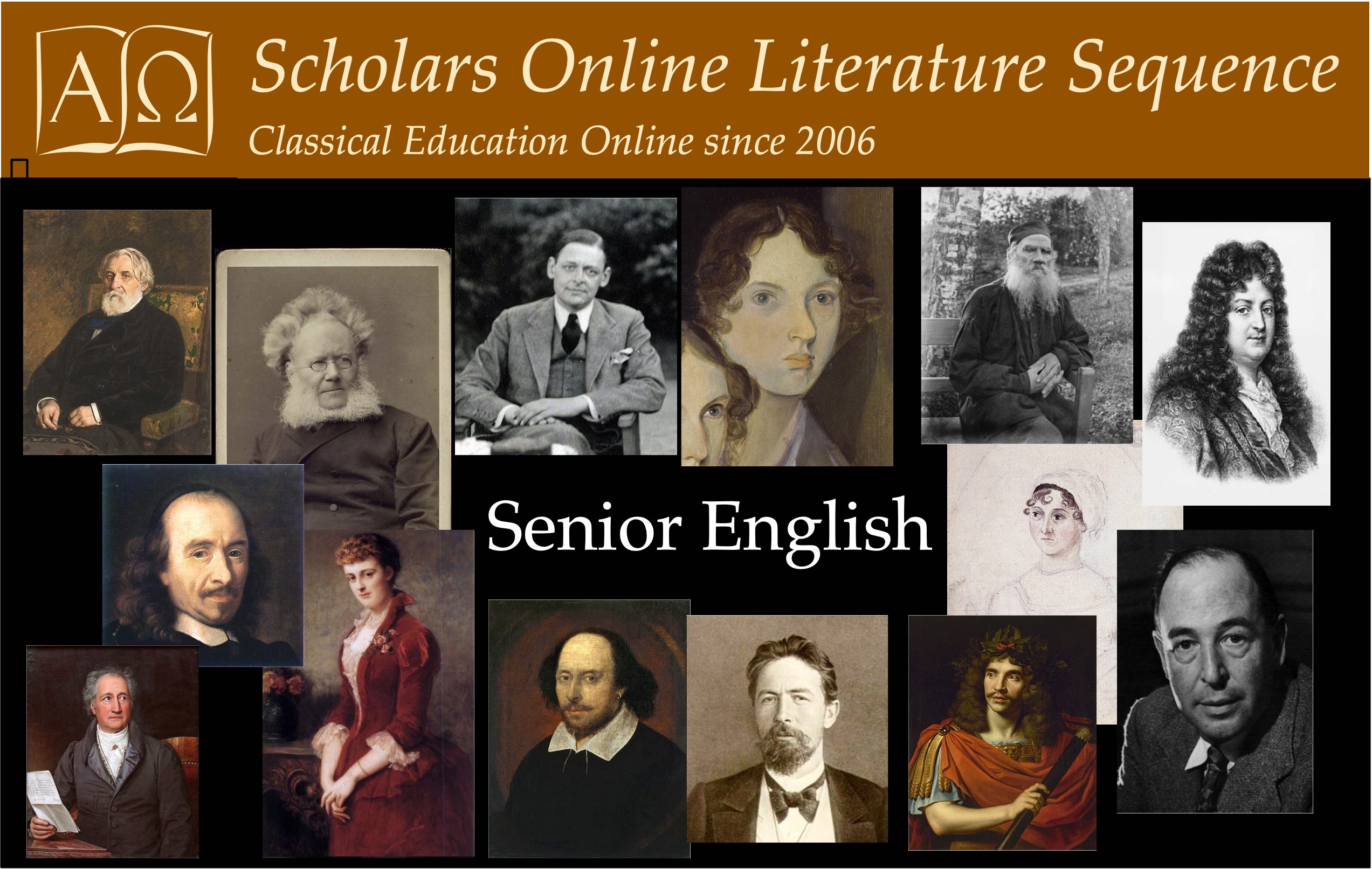 This is possibly the toughest course you will ever take. So people tell me after college. It’s not hard to pass; it’s just a lot of continuous and serious work, including a huge amount of writing — thirty papers, give or take one or two. I mark those brutally and then scale the results generously. Overall, my plan is to stretch your capacities and challenge your assumptions. The class is partly a composition course, partly a course in literary theory, partly an exploration of propositional logic, and a little left over that’s pure fun.
In terms of content, the course fills some of the gaps left by the other courses in the literature sequence, and revisits older authors and topics of particular importance, while helping to build a greater synthetic understanding of literary operations and theory, and enhance proficiency in writing. Accordingly it includes some French classicism, the Russian novel, early German romanticism, and the English gothic as well as more Shakespeare, Greek tragedy, Hawthorne, Melville, and Austen.
We primarily read modern literature in the western tradition, with a few excursions into areas that seem too important to ignore — some of which are also specially noted as relevant in the College Board's AP materials, since the other point of this class is to address the requirements of the College Board Advanced Placement English program, leading to the AP exam. It is not an officially approved AP course; meeting the College Board’s qualifications would, I am persuaded, require me to dumb the course down. Taking the AP Exam is not required. This is possibly the toughest course you will ever take. So people tell me after college. It’s not hard to pass; it’s just a lot of continuous and serious work, including a huge amount of writing — thirty papers, give or take one or two. I mark those brutally and then scale the results generously. Overall, my plan is to stretch your capacities and challenge your assumptions. The class is partly a composition course, partly a course in literary theory, partly an exploration of propositional logic, and a little left over that’s pure fun.
In terms of content, the course fills some of the gaps left by the other courses in the literature sequence, and revisits older authors and topics of particular importance, while helping to build a greater synthetic understanding of literary operations and theory, and enhance proficiency in writing. Accordingly it includes some French classicism, the Russian novel, early German romanticism, and the English gothic as well as more Shakespeare, Greek tragedy, Hawthorne, Melville, and Austen.
We primarily read modern literature in the western tradition, with a few excursions into areas that seem too important to ignore — some of which are also specially noted as relevant in the College Board's AP materials, since the other point of this class is to address the requirements of the College Board Advanced Placement English program, leading to the AP exam. It is not an officially approved AP course; meeting the College Board’s qualifications would, I am persuaded, require me to dumb the course down. Taking the AP Exam is not required. | 1: B. McMenomy Tu 1:00 PM-2:30 PM ET • Th 1:00 PM-2:30 PM ET | $900.00 |
| Western Literature to Dante II | 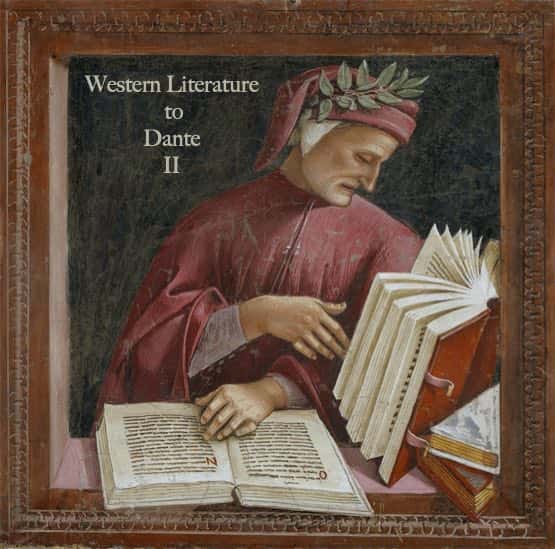 An occasional course offered for students who have an extra year to spend in literary studies, with special focus on classical and mediaeval materials, this course covers roughly the same chronological ground as Western Literature to Dante, but concentrating on different authors and a range of different works by the same authors. An occasional course offered for students who have an extra year to spend in literary studies, with special focus on classical and mediaeval materials, this course covers roughly the same chronological ground as Western Literature to Dante, but concentrating on different authors and a range of different works by the same authors. | 1: B. McMenomy Fr 11:00 AM-12:30 PM ET | $700.00 |
| Mathematics | |||
| Geometry |  In this course, you will develop a logical system of thought. You will examine the properties of geometric shapes, and make conclusions about them using your logical system. This course covers most of Euclidean Geometry and some modern Geometry using traditional western tools of compass and straightedge and eastern tools of paper folding (origami) and modern tools (Geometer Sketchpad). Analytic Geometry is included to reinforce previously learned Algebra skills. The early part of the course has the students investigating geometric phenomena and collecting conjectures about what they see. Later on the students prove the conjectures they have collected. Topics may include: similar and congruent figures, angles, geometric proofs, conjectures, counter examples, if-then statements, inductive and deductive reasoning, valid and invalid reasoning, postulates and proof, coordinate geometry, transformational geometry, transformation matrices, special right triangles.
Class sessions will take place using a virtual white board over ZOOM. All class sessions are archived for review by the students or if the student is unable to attend for any reason. Students will receive a secure invitation from the instructor to attend class sessions.
The student will be able to download a set of Guided Notes from the Moodle for each chapter. These will assist our work together and help to make connections between the readings, the class discussions and the homework.
Homework will be assigned and discussed during class time. ALL quizzes and tests will be posted on the Moodle and will be available to be downloaded by the student when the student and their parent are both notified by email. They are to be competed and returned to the instructor for evaluation. Students will have an opportunity to correct all assessments to show mastery. It is the responsibility of the parents to supervise their student while completing each assessment. The evaluations will be returned to both the student and parent. Progress reports will be sent out to the student and parent on a regular basis. In this course, you will develop a logical system of thought. You will examine the properties of geometric shapes, and make conclusions about them using your logical system. This course covers most of Euclidean Geometry and some modern Geometry using traditional western tools of compass and straightedge and eastern tools of paper folding (origami) and modern tools (Geometer Sketchpad). Analytic Geometry is included to reinforce previously learned Algebra skills. The early part of the course has the students investigating geometric phenomena and collecting conjectures about what they see. Later on the students prove the conjectures they have collected. Topics may include: similar and congruent figures, angles, geometric proofs, conjectures, counter examples, if-then statements, inductive and deductive reasoning, valid and invalid reasoning, postulates and proof, coordinate geometry, transformational geometry, transformation matrices, special right triangles.
Class sessions will take place using a virtual white board over ZOOM. All class sessions are archived for review by the students or if the student is unable to attend for any reason. Students will receive a secure invitation from the instructor to attend class sessions.
The student will be able to download a set of Guided Notes from the Moodle for each chapter. These will assist our work together and help to make connections between the readings, the class discussions and the homework.
Homework will be assigned and discussed during class time. ALL quizzes and tests will be posted on the Moodle and will be available to be downloaded by the student when the student and their parent are both notified by email. They are to be competed and returned to the instructor for evaluation. Students will have an opportunity to correct all assessments to show mastery. It is the responsibility of the parents to supervise their student while completing each assessment. The evaluations will be returned to both the student and parent. Progress reports will be sent out to the student and parent on a regular basis. | 1: A. Mabbott Mo 11:00 AM-12:00 PM ET • We 11:00 AM-12:00 PM ET • Fr 11:00 AM-12:00 PM ET | $700.00 |
| Algebra 2 (Advanced Algebra) | 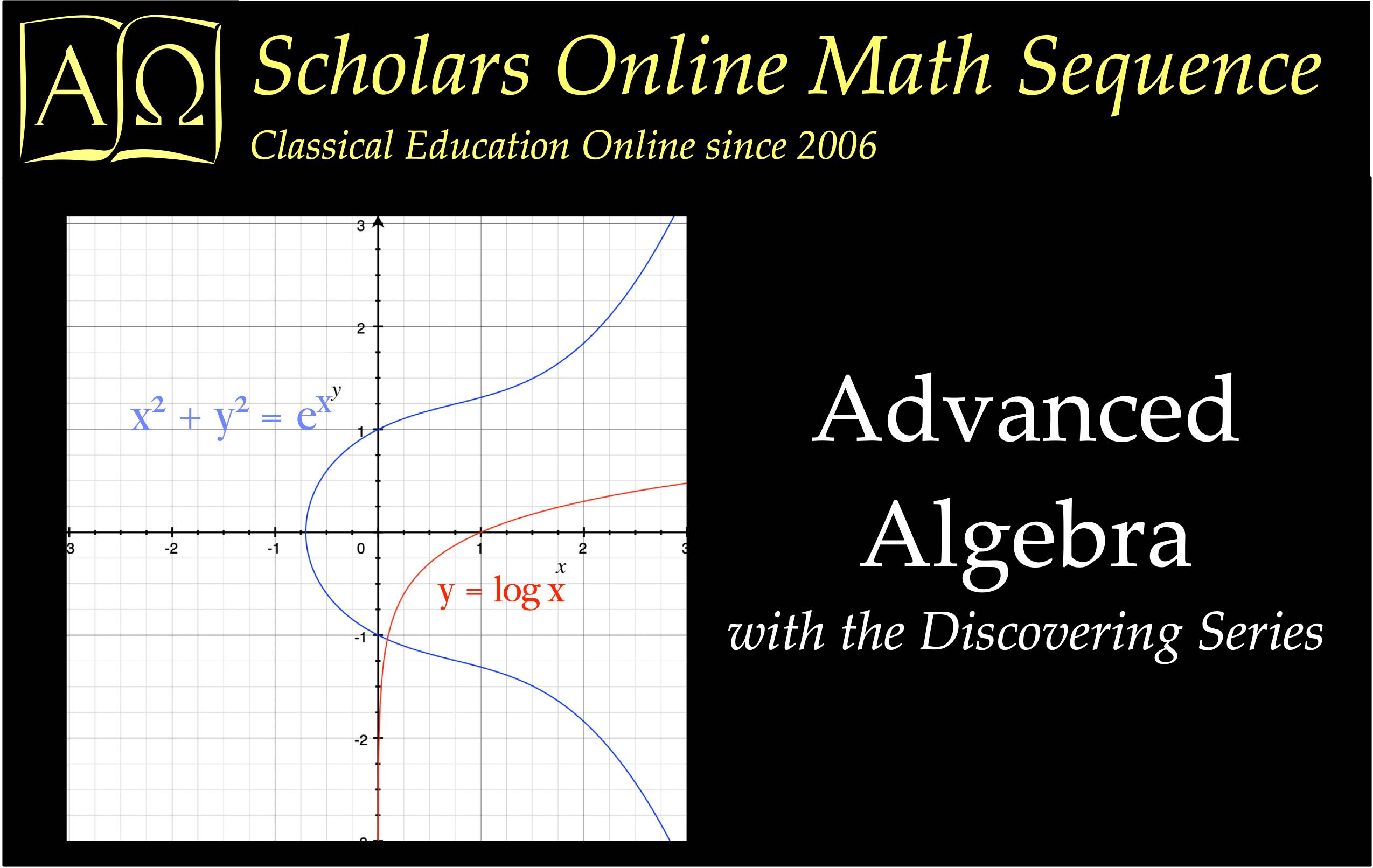 As far as possible, students are allowed to investigate algebraic concepts and processes before being introduced to the formulas and symbolic representations. Topics for exploration will include: linear, quadratic, exponential, logarithmic, rational, and irrational functions. You will expand your understanding of the number system to include complex numbers, and you will develop an understanding of the concepts of elementary trigonometry, elementary probability, and sequences and series. You also will learn to model real-world problems using these concepts.
A graphing calculator will be required at this level and beyond.
Class sessions will take place using a virtual white board over ZOOM. All class sessions are archived for review by the students or if the student is unable to attend for any reason. Students will receive a secure invitation from the instructor to attend class sessions.
The student will be able to download a set of Guided Notes from the Moodle for each chapter. These will assist our work together and help to make connections between the readings, the class discussions and the homework.
Homework will be assigned and discussed during class time. ALL quizzes and tests will be posted on the Moodle and will be available to be downloaded by the student when the student and their parent are both notified by email. They are to be competed and returned to the instructor for evaluation. Students will have an opportunity to correct all assessments to show mastery. It is the responsibility of the parents to supervise their student while completing each assessment. The evaluations will be returned to both the student and parent. Progress reports will be sent out to the student and parent on a regular basis. As far as possible, students are allowed to investigate algebraic concepts and processes before being introduced to the formulas and symbolic representations. Topics for exploration will include: linear, quadratic, exponential, logarithmic, rational, and irrational functions. You will expand your understanding of the number system to include complex numbers, and you will develop an understanding of the concepts of elementary trigonometry, elementary probability, and sequences and series. You also will learn to model real-world problems using these concepts.
A graphing calculator will be required at this level and beyond.
Class sessions will take place using a virtual white board over ZOOM. All class sessions are archived for review by the students or if the student is unable to attend for any reason. Students will receive a secure invitation from the instructor to attend class sessions.
The student will be able to download a set of Guided Notes from the Moodle for each chapter. These will assist our work together and help to make connections between the readings, the class discussions and the homework.
Homework will be assigned and discussed during class time. ALL quizzes and tests will be posted on the Moodle and will be available to be downloaded by the student when the student and their parent are both notified by email. They are to be competed and returned to the instructor for evaluation. Students will have an opportunity to correct all assessments to show mastery. It is the responsibility of the parents to supervise their student while completing each assessment. The evaluations will be returned to both the student and parent. Progress reports will be sent out to the student and parent on a regular basis. | 1: A. Mabbott Mo 1:00 PM-2:00 PM ET • We 1:00 PM-2:00 PM ET • Fr 1:00 PM-2:00 PM ET | $700.00 |
| Pre-Calculus with Trigonometry | 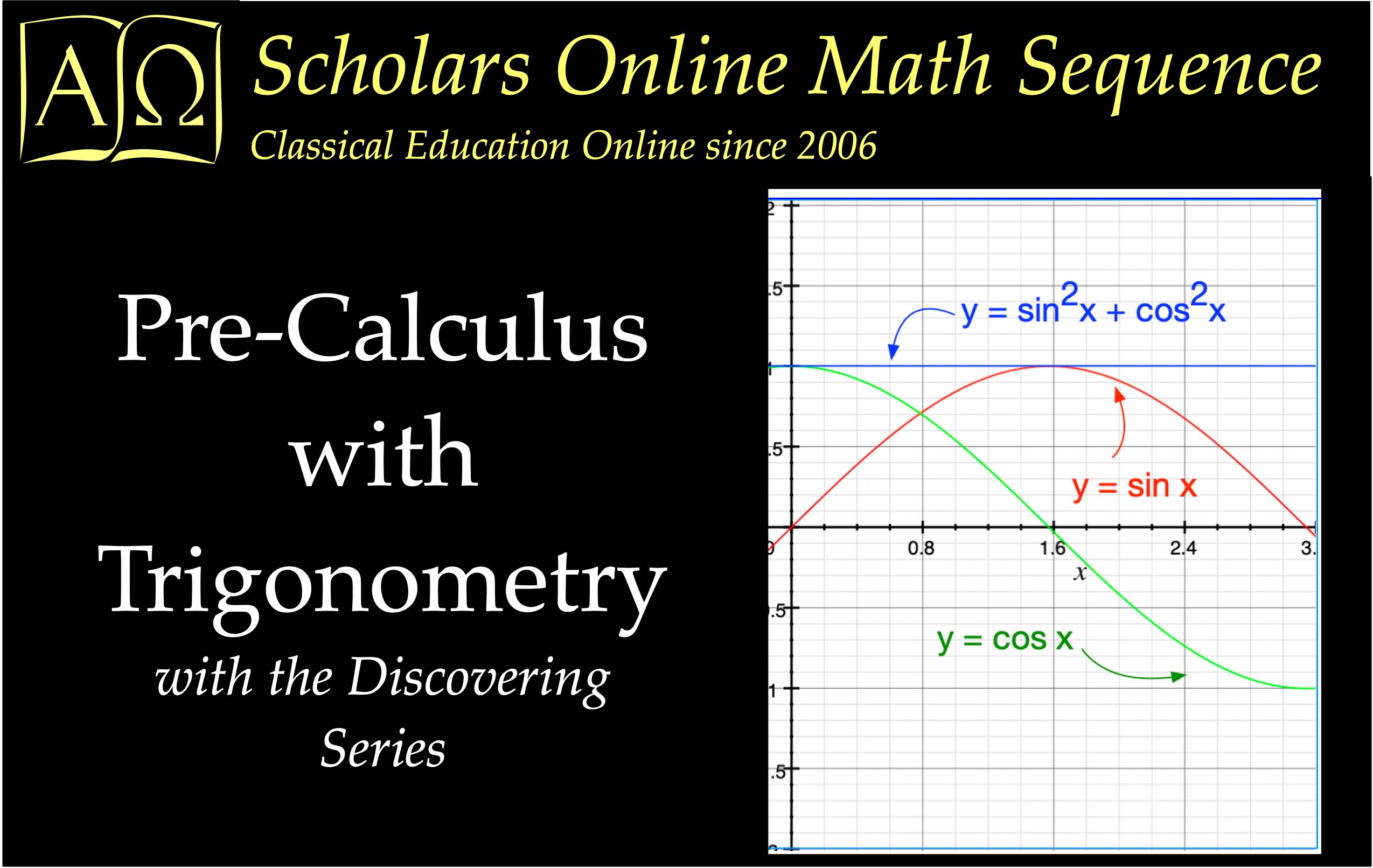 Pre-Calculus, is the bridge course to Calculus. We will integrate rigorous real world mathematical scenarios with technology - Calculator and Dynamic Software. We will cement the concept that variables really vary. Beyond the traditional topics, we will be able to study concepts such as harmonic analysis of complex wave patterns and logistic functions for restricted populations growth. We will examine problems from multiple perspectives - graphical, tabular, functional, and situational. And we will revisit one of our tools from Geometry to assist us in our analysis of complex functions.
Class sessions will take place using a virtual white board over ZOOM. All class sessions are archived for review by the students or if the student is unable to attend for any reason. Students will receive a secure invitation from the instructor to attend class sessions.
The student will be able to download a set of Guided Notes from the Moodle for each chapter. These will assist our work together and help to make connections between the readings, the class discussions and the homework.
Homework will be assigned and discussed during class time. ALL quizzes and tests will be posted on the Moodle and will be available to be downloaded by the student when the student and their parent are both notified by email. They are to be competed and returned to the instructor for evaluation. Students will have an opportunity to correct all assessments to show mastery. It is the responsibility of the parents to supervise their student while completing each assessment. The evaluations will be returned to both the student and parent. Progress reports will be sent out to the student and parent on a regular basis. Pre-Calculus, is the bridge course to Calculus. We will integrate rigorous real world mathematical scenarios with technology - Calculator and Dynamic Software. We will cement the concept that variables really vary. Beyond the traditional topics, we will be able to study concepts such as harmonic analysis of complex wave patterns and logistic functions for restricted populations growth. We will examine problems from multiple perspectives - graphical, tabular, functional, and situational. And we will revisit one of our tools from Geometry to assist us in our analysis of complex functions.
Class sessions will take place using a virtual white board over ZOOM. All class sessions are archived for review by the students or if the student is unable to attend for any reason. Students will receive a secure invitation from the instructor to attend class sessions.
The student will be able to download a set of Guided Notes from the Moodle for each chapter. These will assist our work together and help to make connections between the readings, the class discussions and the homework.
Homework will be assigned and discussed during class time. ALL quizzes and tests will be posted on the Moodle and will be available to be downloaded by the student when the student and their parent are both notified by email. They are to be competed and returned to the instructor for evaluation. Students will have an opportunity to correct all assessments to show mastery. It is the responsibility of the parents to supervise their student while completing each assessment. The evaluations will be returned to both the student and parent. Progress reports will be sent out to the student and parent on a regular basis. | 1: A. Mabbott Mo 3:00 PM-4:00 PM ET • We 3:00 PM-4:00 PM ET • Fr 3:00 PM-4:00 PM ET | $700.00 |
| Calculus | 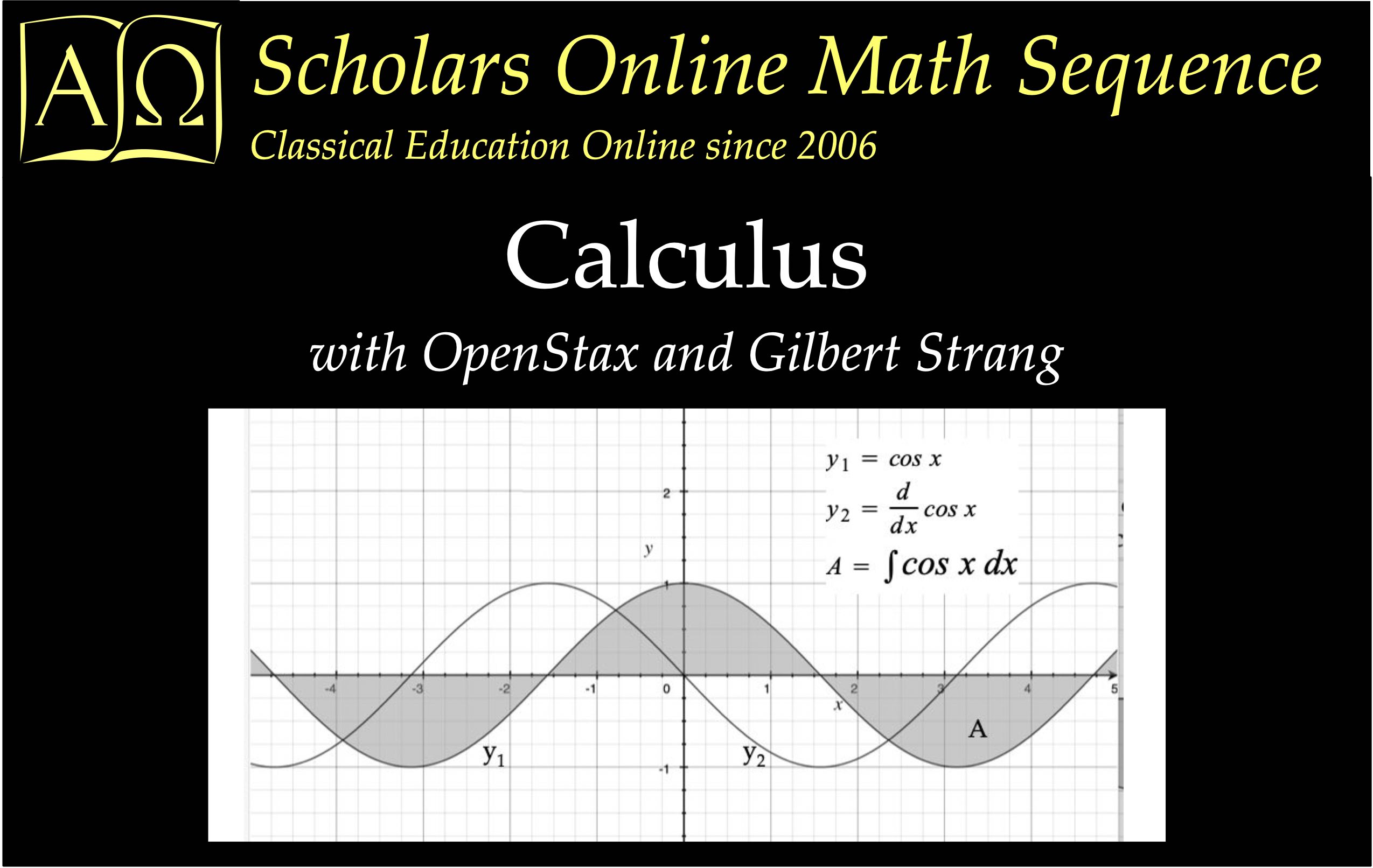 The topics for this course include Limits, Derivatives, and Integrals (both Definite and Indefinite). We will explore tools and techniques for applying these concepts, such as the Derivatives of Products and Quotients, and the Chain Rule. We will also form connections with the physical world, both for understanding and also for application. We'll use computers and apps where appropriate.
We will be using the material in the openstax.org textbook. "Calculus Volume 1"; this will be supplemented with material from Calculus Made Easy: Expanded and Modernized (Full Color)" which is an optional textbook. The topics for this course include Limits, Derivatives, and Integrals (both Definite and Indefinite). We will explore tools and techniques for applying these concepts, such as the Derivatives of Products and Quotients, and the Chain Rule. We will also form connections with the physical world, both for understanding and also for application. We'll use computers and apps where appropriate.
We will be using the material in the openstax.org textbook. "Calculus Volume 1"; this will be supplemented with material from Calculus Made Easy: Expanded and Modernized (Full Color)" which is an optional textbook. | 1: J. Hogan Mo 3:30 PM-5:00 PM ET • We 3:30 PM-5:00 PM ET | $700.00 |
| Philosophy | |||
| Introduction to Philosophy | 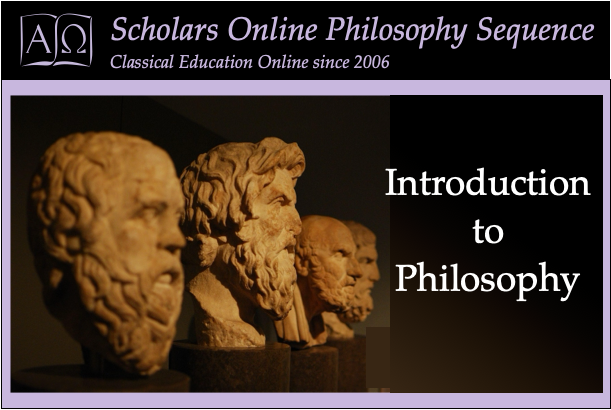 This course is an introduction to philosophy.
The chief text is Mortimer Adler’s Aristotle for Everybody, which describes how the Greek philosopher Aristotle addressed philosophical questions. Aristotle lived a long time ago but, as Adler points out, his thinking remains valuable today. Adler’s book will be supplemented with readings from other philosophers.
A student who completes this course will be familiar with questions that philosophers have asked and understand why those questions are interesting. Here are examples of the questions that the course will address:
What is logical thinking and why is logic persuasive?
What kinds of things are there? Are there immaterial things?
What are material things? What makes living things different from nonliving things?
How does science work? What makes one scientific theory better than another?
Are there objective moral rights and wrongs, virtues and vices?
Do we know any truths about the world?
Can there be an infinite number of things?
Does God exist?
Additional questions can be suggested by the students. This course is an introduction to philosophy.
The chief text is Mortimer Adler’s Aristotle for Everybody, which describes how the Greek philosopher Aristotle addressed philosophical questions. Aristotle lived a long time ago but, as Adler points out, his thinking remains valuable today. Adler’s book will be supplemented with readings from other philosophers.
A student who completes this course will be familiar with questions that philosophers have asked and understand why those questions are interesting. Here are examples of the questions that the course will address:
What is logical thinking and why is logic persuasive?
What kinds of things are there? Are there immaterial things?
What are material things? What makes living things different from nonliving things?
How does science work? What makes one scientific theory better than another?
Are there objective moral rights and wrongs, virtues and vices?
Do we know any truths about the world?
Can there be an infinite number of things?
Does God exist?
Additional questions can be suggested by the students.
| 1: K. Oles Fr 12:00 PM-1:00 PM ET | $500.00 |
| Science | |||
| Natural Science I | 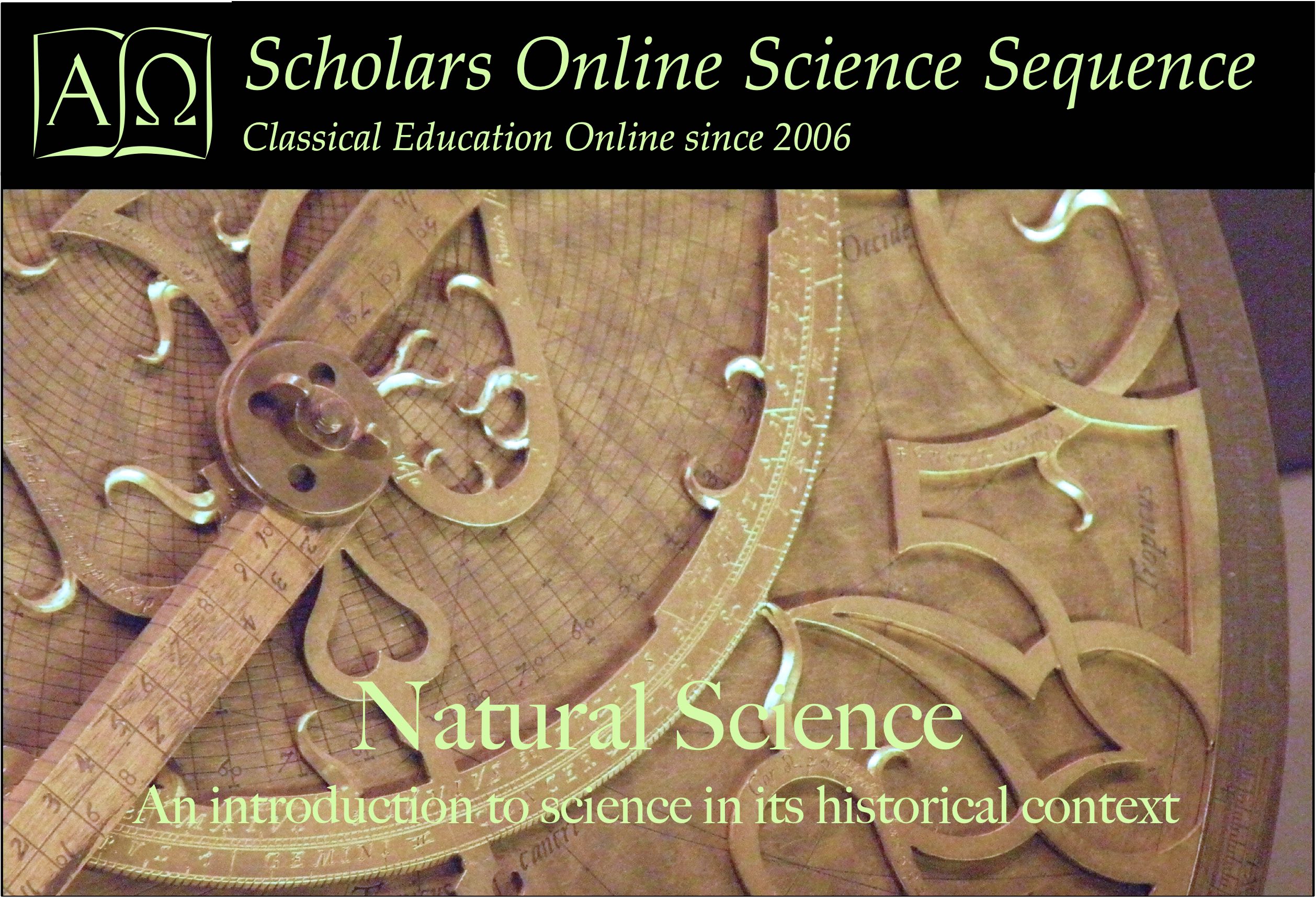 Natural Science is a unique two-year course for junior high and early high school students, designed to provide the background and skills in earth, life, and physical sciences necessary for success in intensive college-preparatory courses in the sciences, specifically Scholars Online's Honors and AP compliant courses in Biology, Chemistry, Physics, and Astronomy. Adults wishing to gain a new perspective on science or refresh their understanding of key concepts are also welcome to take the course.
Using a wide range of internet readings, simulations, and videos, we explore the core concepts of modern science in their social and historical contexts, rather than as abstract theories isolated from each other or their historical roots.
Discover the basic principles underlying both the physical and life sciences, including matter theory, motion and force, energy, electricity and magnetism, classification of living things, ecology, evolution, and cellular biology, see how these apply to the sciences of geology, meteorology, astronomy, oceanography, zoology and botany, and learn how some theories were readily accepted while others were challenged for both scientific and social reasons as we move through the history of scientific ideas from the ancient world to our own time. Learn to apply and recognize the limitations and advantages of scientific methodology, experimental and observational methods, to use mathematical methods for data analysis, and to appreciate not only the interrelations between different areas of scientific knowledge, but how the methods of critical analysis of observations developed, and how social forces shaped modern science.
The first year covers astronomy, biology, matter theory, engineering, and mathematics during ancient, medieval, and Renaissance periods.
For more information on how this course fits into the Scholars Online Science Curriculum, please read the Science Curricum Design page.
This course is taught using the Scholars Online Chat software, which allows the teacher to embed graphics, mathematical equations, and movies in the chat session, with complete logging available for the entire year. Audio software is deliberately not used, as a means of enforcing students students to think clearly and write precisely. [Students with limited online bandwidth can also participate fully in the course.] Natural Science is a unique two-year course for junior high and early high school students, designed to provide the background and skills in earth, life, and physical sciences necessary for success in intensive college-preparatory courses in the sciences, specifically Scholars Online's Honors and AP compliant courses in Biology, Chemistry, Physics, and Astronomy. Adults wishing to gain a new perspective on science or refresh their understanding of key concepts are also welcome to take the course.
Using a wide range of internet readings, simulations, and videos, we explore the core concepts of modern science in their social and historical contexts, rather than as abstract theories isolated from each other or their historical roots.
Discover the basic principles underlying both the physical and life sciences, including matter theory, motion and force, energy, electricity and magnetism, classification of living things, ecology, evolution, and cellular biology, see how these apply to the sciences of geology, meteorology, astronomy, oceanography, zoology and botany, and learn how some theories were readily accepted while others were challenged for both scientific and social reasons as we move through the history of scientific ideas from the ancient world to our own time. Learn to apply and recognize the limitations and advantages of scientific methodology, experimental and observational methods, to use mathematical methods for data analysis, and to appreciate not only the interrelations between different areas of scientific knowledge, but how the methods of critical analysis of observations developed, and how social forces shaped modern science.
The first year covers astronomy, biology, matter theory, engineering, and mathematics during ancient, medieval, and Renaissance periods.
For more information on how this course fits into the Scholars Online Science Curriculum, please read the Science Curricum Design page.
This course is taught using the Scholars Online Chat software, which allows the teacher to embed graphics, mathematical equations, and movies in the chat session, with complete logging available for the entire year. Audio software is deliberately not used, as a means of enforcing students students to think clearly and write precisely. [Students with limited online bandwidth can also participate fully in the course.]
| 1: C. McMenomy Th 11:00 AM-12:30 PM ET | $600.00 |
| Natural Science II | 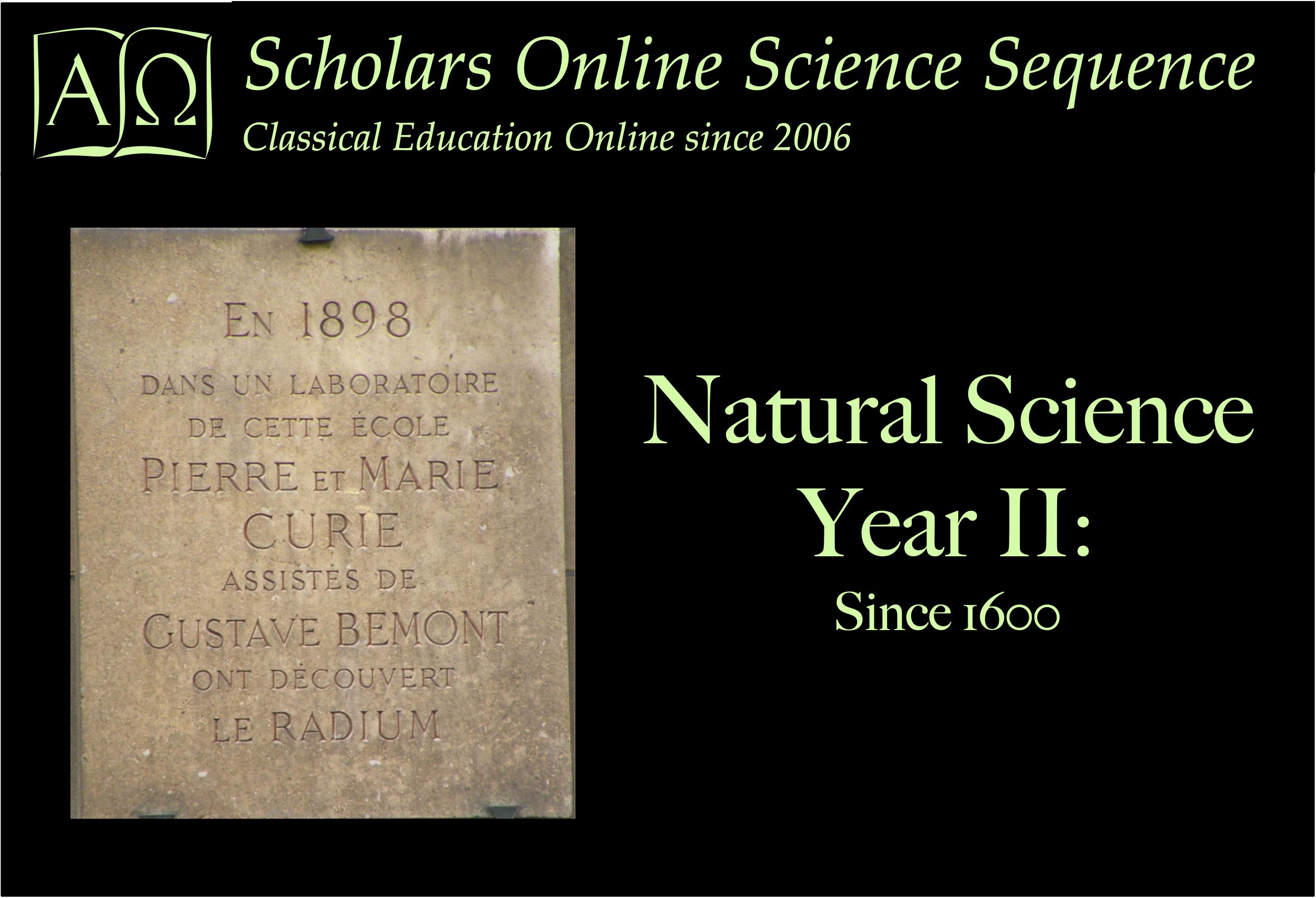 Natural Science is a unique two-year course for junior high and early high school students, designed to provide the background and skills in earth, life, and physical sciences necessary for success in intensive college-preparatory courses in the sciences, specifically Scholars Online's courses in Biology, Chemistry, Physics, and Astronomy. Adults wishing to gain a new perspective on science or refresh their understanding of key concepts are also welcome to take the course.
Using a wide range of internet readings, simulations, and videos, we explore the core concepts of modern science in their social and historical contexts, rather than as abstract theories isolated from each other or their historical roots.
Discover the basic principles underlying both the physical and life sciences, including matter theory, motion and force, energy, electricity and magnetism, classification of living things, ecology, evolution, and cellular biology, see how these apply to the sciences of geology, meteorology, astronomy, oceanography, zoology and botany, and learn how some theories were readily accepted while others were challenged for both scientific and social reasons as we move through the history of scientific ideas from the ancient world to our own time. Learn to apply and recognize the limitations and advantages of scientific methodology, experimental and observational methods, to use mathematical methods for data analysis, and to appreciate not only the interrelations between different areas of scientific knowledge, but how the methods of critical analysis of observations developed, and how social forces shaped modern science.
The second year covers the development of modern science since the Renaissance, including the development of chemistry, thermodynamics, genetics, quantum mechanics, relativity, information science, ecology and cosmology.
.
For more information on how this course fits into the Scholars Online Science Curriculum, please read the Science Curricum Design page.
This course is taught using the Scholars Online Chat software, which allows the teacher to embed graphics, mathematical equations, and movies in the chat session, with complete logging available for the entire year. Audio software is deliberately not used, as a means of enforcing students students to think clearly and write precisely. [Students with limited online bandwidth can also participate fully in the course.] Natural Science is a unique two-year course for junior high and early high school students, designed to provide the background and skills in earth, life, and physical sciences necessary for success in intensive college-preparatory courses in the sciences, specifically Scholars Online's courses in Biology, Chemistry, Physics, and Astronomy. Adults wishing to gain a new perspective on science or refresh their understanding of key concepts are also welcome to take the course.
Using a wide range of internet readings, simulations, and videos, we explore the core concepts of modern science in their social and historical contexts, rather than as abstract theories isolated from each other or their historical roots.
Discover the basic principles underlying both the physical and life sciences, including matter theory, motion and force, energy, electricity and magnetism, classification of living things, ecology, evolution, and cellular biology, see how these apply to the sciences of geology, meteorology, astronomy, oceanography, zoology and botany, and learn how some theories were readily accepted while others were challenged for both scientific and social reasons as we move through the history of scientific ideas from the ancient world to our own time. Learn to apply and recognize the limitations and advantages of scientific methodology, experimental and observational methods, to use mathematical methods for data analysis, and to appreciate not only the interrelations between different areas of scientific knowledge, but how the methods of critical analysis of observations developed, and how social forces shaped modern science.
The second year covers the development of modern science since the Renaissance, including the development of chemistry, thermodynamics, genetics, quantum mechanics, relativity, information science, ecology and cosmology.
.
For more information on how this course fits into the Scholars Online Science Curriculum, please read the Science Curricum Design page.
This course is taught using the Scholars Online Chat software, which allows the teacher to embed graphics, mathematical equations, and movies in the chat session, with complete logging available for the entire year. Audio software is deliberately not used, as a means of enforcing students students to think clearly and write precisely. [Students with limited online bandwidth can also participate fully in the course.]
| 1: C. McMenomy Tu 11:00 AM-12:30 PM ET | $600.00 |
| Biology |  Biology builds on concepts of matter and living organisms acquired in junior high or basic chemistry. Working from the simplest living materials to complex systems, students learn how organic molecules and simple metabolic reactions form the components of prokaryotic and eukaryotic cells, use energy for the processes of cellular respiration and photosynthesis, and promote the transmission of genetic information from one cell generation to the next. We'll look at how modern biologists apply their implications and conclusions to explain the unity and diversity of life, and discuss the evidence and issues surrounding evolution theory. During the spring semester, we will investigate the anatomy and physiology of animals with an emphasis on the human body and current health issues, then look at similar structures and processes within plants. Our final unit synthesizes field observations to help us understand how individual organisms function and interact as parts of complex environmental systems.
REQUIRED LAB WORK: Students must complete eighteen basic biology labs for course credit.
This course is taught using the Scholars Online Chat software, which allows the teacher to embed graphics, mathematical equations, and movies in the chat session, with complete logging available for the entire year. Video software is not used to allow students with limited internet access to participate fully, and to encourage reflection, precise thinking, and careful writing skills. Biology builds on concepts of matter and living organisms acquired in junior high or basic chemistry. Working from the simplest living materials to complex systems, students learn how organic molecules and simple metabolic reactions form the components of prokaryotic and eukaryotic cells, use energy for the processes of cellular respiration and photosynthesis, and promote the transmission of genetic information from one cell generation to the next. We'll look at how modern biologists apply their implications and conclusions to explain the unity and diversity of life, and discuss the evidence and issues surrounding evolution theory. During the spring semester, we will investigate the anatomy and physiology of animals with an emphasis on the human body and current health issues, then look at similar structures and processes within plants. Our final unit synthesizes field observations to help us understand how individual organisms function and interact as parts of complex environmental systems.
REQUIRED LAB WORK: Students must complete eighteen basic biology labs for course credit.
This course is taught using the Scholars Online Chat software, which allows the teacher to embed graphics, mathematical equations, and movies in the chat session, with complete logging available for the entire year. Video software is not used to allow students with limited internet access to participate fully, and to encourage reflection, precise thinking, and careful writing skills. | 1: C. McMenomy Mo 1:00 PM-2:30 PM ET • We 1:00 PM-2:30 PM ET | $750.00 |
| Astronomy | 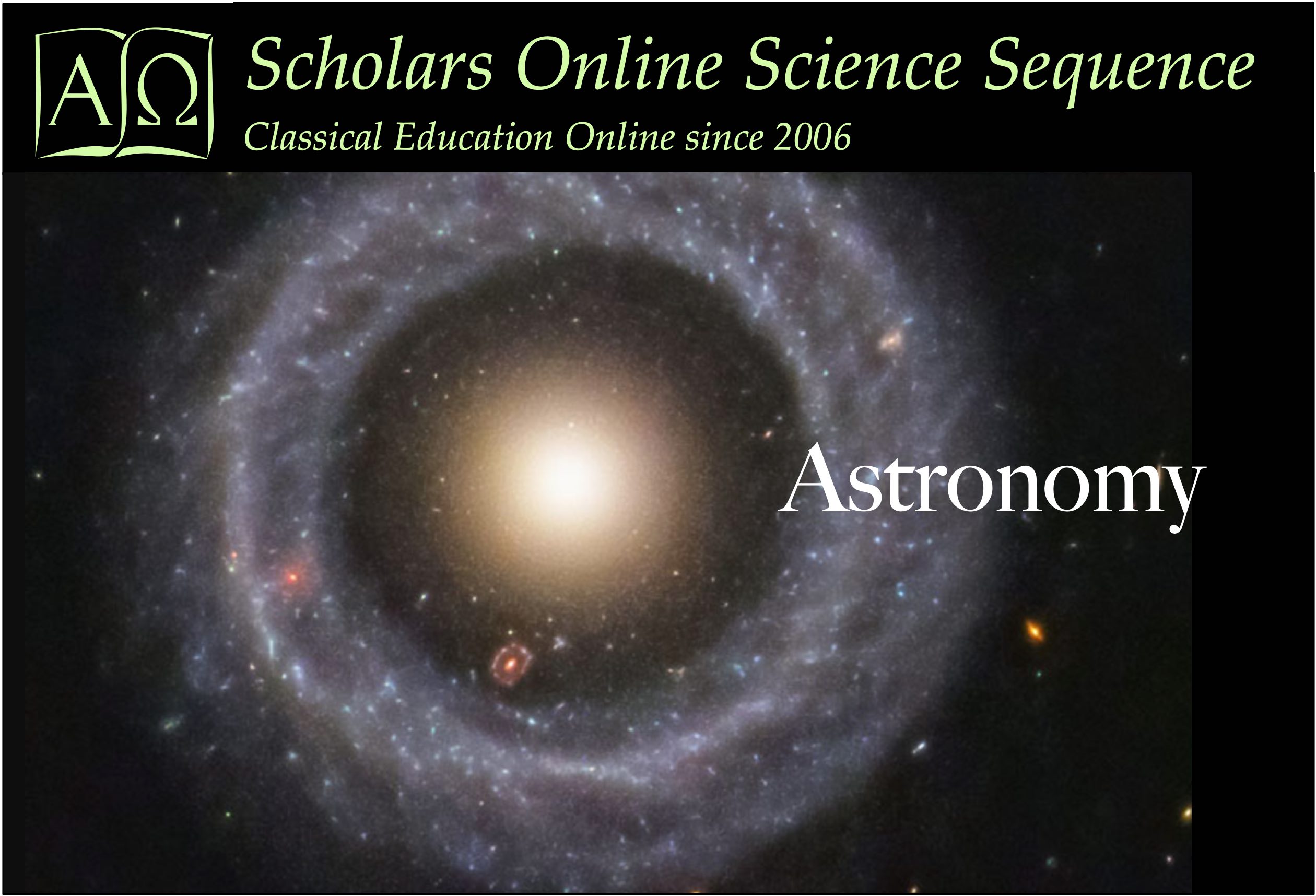 We'll study the principles of modern astronomy, including basic constellation recognition, apparent motions of celestial objects, development of the Copernican model of the solar system, telescope optics, characteristics of solar system planets, stellar structure and life cycles, and current theories on the origin of the universe. Learn how to navigate by the stars, why planets stay in orbit around the sun, what causes a supernova, and what modern astronomers think happened in the first three seconds of the universe!
This course is taught using the Scholars Online Chat software, which allows the teacher to embed graphics, mathematical equations, and movies in the chat session, with complete logging available for the entire year. Audio software is not used to allow students with limited internet access to participate fully, and to encourage precise thinking and writing skills. We'll study the principles of modern astronomy, including basic constellation recognition, apparent motions of celestial objects, development of the Copernican model of the solar system, telescope optics, characteristics of solar system planets, stellar structure and life cycles, and current theories on the origin of the universe. Learn how to navigate by the stars, why planets stay in orbit around the sun, what causes a supernova, and what modern astronomers think happened in the first three seconds of the universe!
This course is taught using the Scholars Online Chat software, which allows the teacher to embed graphics, mathematical equations, and movies in the chat session, with complete logging available for the entire year. Audio software is not used to allow students with limited internet access to participate fully, and to encourage precise thinking and writing skills. | 1: C. McMenomy Tu 1:00 PM-2:30 PM ET | $600.00 |
| Chemistry |  Chemistry builds on concepts of matter and chemical reactions acquired in junior high or basic chemistry by introducing more advanced methods of chemical analysis and more detailed models of atomic structure, electron configurations, and chemical bonds. Using these tools, we explore aspects of acid-base and precipitation reactions, simple solution preparation, chemical equilibria, and energy. We then look at the factors affection reaction rates, especially for reactions in solutions and electric cells. Additional topics may include environmental chemistry, organic chemistry, biochemistry, and the characteristics of chemical families, depending on student interest.
REQUIRED LAB WORK: Students must complete three safety checkout labs, then design, plan, and carry out nine labs (total 12 labs) for course credit.
This course is taught using the Scholars Online Chat software, which allows the teacher to embed graphics, mathematical equations, and movies in the chat session, with complete logging available for the entire year. Audio software is not used to allow students with limited internet access to participate fully, and to encourage precise thinking and writing skills. Chemistry builds on concepts of matter and chemical reactions acquired in junior high or basic chemistry by introducing more advanced methods of chemical analysis and more detailed models of atomic structure, electron configurations, and chemical bonds. Using these tools, we explore aspects of acid-base and precipitation reactions, simple solution preparation, chemical equilibria, and energy. We then look at the factors affection reaction rates, especially for reactions in solutions and electric cells. Additional topics may include environmental chemistry, organic chemistry, biochemistry, and the characteristics of chemical families, depending on student interest.
REQUIRED LAB WORK: Students must complete three safety checkout labs, then design, plan, and carry out nine labs (total 12 labs) for course credit.
This course is taught using the Scholars Online Chat software, which allows the teacher to embed graphics, mathematical equations, and movies in the chat session, with complete logging available for the entire year. Audio software is not used to allow students with limited internet access to participate fully, and to encourage precise thinking and writing skills. | 1: C. McMenomy TBD with enrolled students. | $750.00 |
| Physics |  Physics builds on concepts of matter, force, and energy acquired in junior high by introducing more advanced methods of mathematical, dimensional, and graphical analysis to explore the fundamentals of classical mechanics: force, energy, and momentum, and uses these to show how energy and momentum are conserved in linear, circular, and rotational motion, as well as systems in equilibrium. During spring semester, we will use similar tools and methods to explore electricity, magnetism, optics, relativity, quantum mechanics, and nuclear physics.
REQUIRED LAB WORK: Students must design, plan, and carry out twelve labs for course credit.
This course is taught using the Scholars Online Chat software, which allows the teacher to embed graphics, mathematical equations, and movies in the chat session, with complete logging available for the entire year. Audio software is not used to allow students with limited internet access to participate fully, and to encourage precise thinking and writing skills. Physics builds on concepts of matter, force, and energy acquired in junior high by introducing more advanced methods of mathematical, dimensional, and graphical analysis to explore the fundamentals of classical mechanics: force, energy, and momentum, and uses these to show how energy and momentum are conserved in linear, circular, and rotational motion, as well as systems in equilibrium. During spring semester, we will use similar tools and methods to explore electricity, magnetism, optics, relativity, quantum mechanics, and nuclear physics.
REQUIRED LAB WORK: Students must design, plan, and carry out twelve labs for course credit.
This course is taught using the Scholars Online Chat software, which allows the teacher to embed graphics, mathematical equations, and movies in the chat session, with complete logging available for the entire year. Audio software is not used to allow students with limited internet access to participate fully, and to encourage precise thinking and writing skills. | 1: C. McMenomy Mo 11:00 AM-12:30 PM ET • We 11:00 AM-12:30 PM ET | $750.00 |
 Scholars Online is fully accredited through the Middle States Accreditation Commissions on Elementary and Secondary Schools.
Scholars Online is fully accredited through the Middle States Accreditation Commissions on Elementary and Secondary Schools.
Hosted on Interserver
